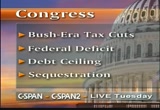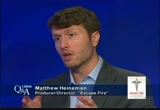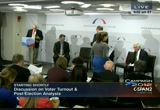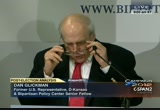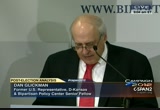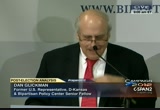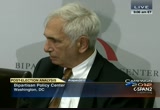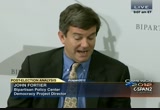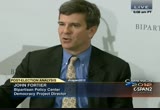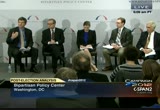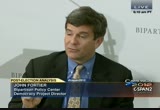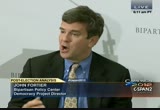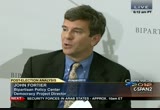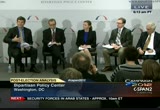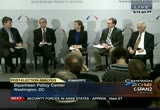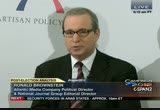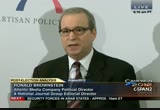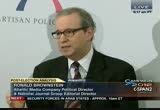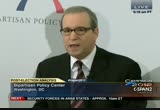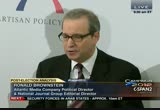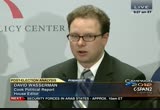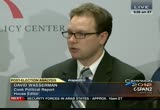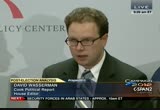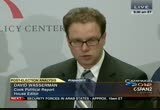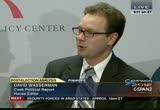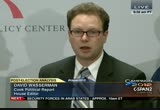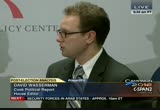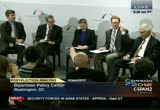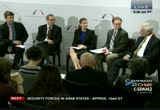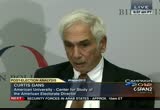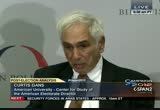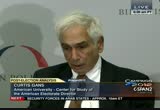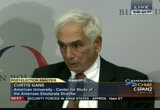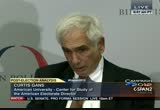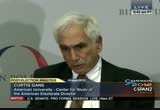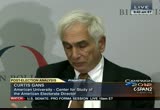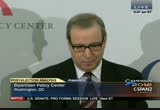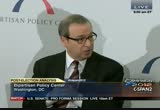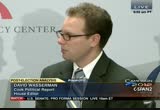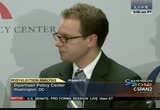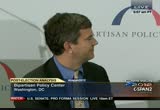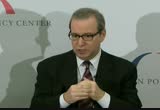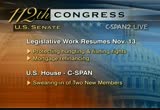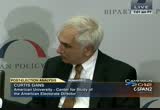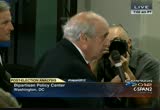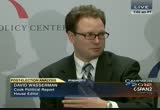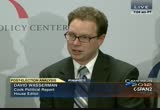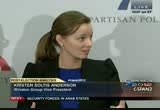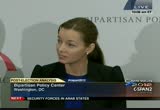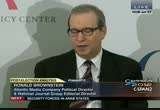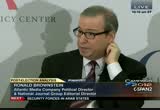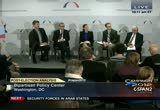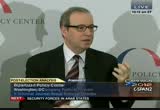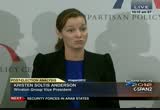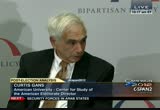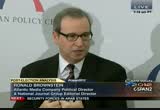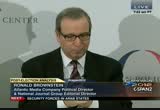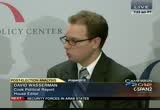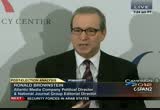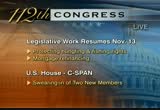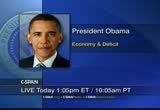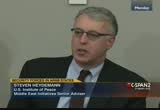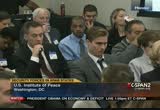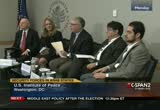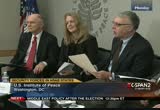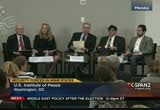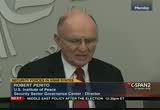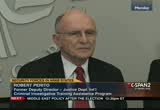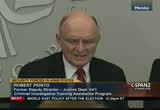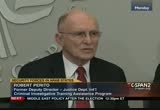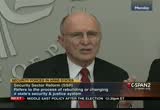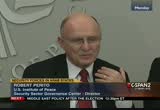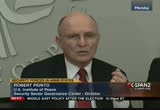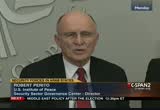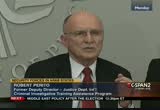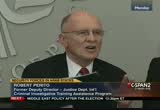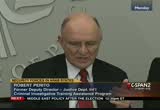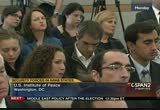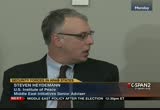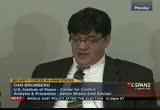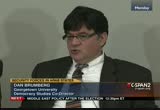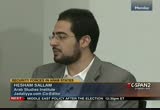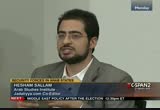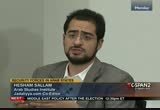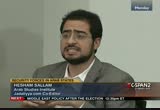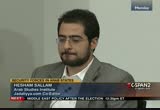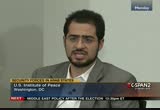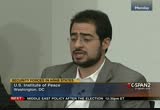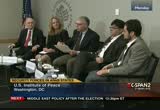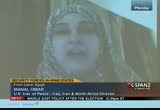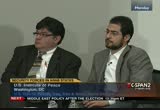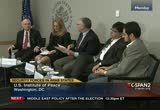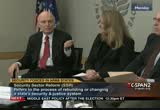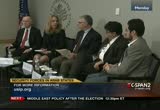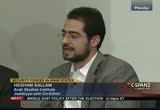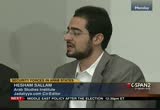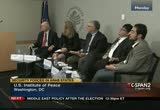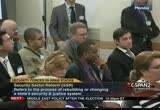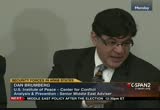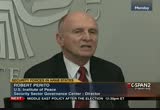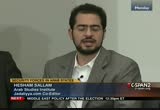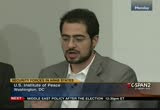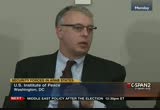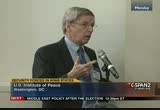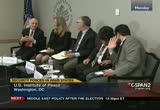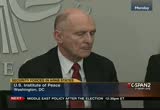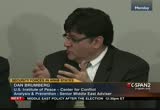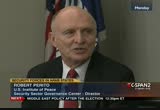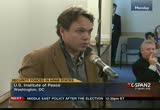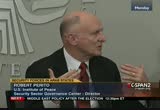tv U.S. Senate CSPAN November 9, 2012 9:00am-12:00pm EST
9:00 am
follow all afford abate starting tuesday with white house coverage on c-span and the senate on c-span2. >> i want it to be intensely journalistic. intensely journalistic because and unless you get and look at what's going on these days, you are going miss the things that are interesting to yourself and everyone else. >> tom wolfe is like sunday for this year's opening night at miami book fair international. he will discuss his latest novel and its take on the city of miami. plus he will answer questions from the miami audience sunday at 6 p.m. eastern on booktv on c-span2.
9:01 am
>> where is sergeant dh today? >> so, we ended up following him after this plane ride for many months as i said, and he ended up injuring himself into a program at walter reed what it ended up using acupuncture, using meditation, using other techniques to wean him off of all the drugs that he was on, and through this program he actually was able to walk out of walter reed on his own two feet. so, you know, i really commend the military for two things, for
9:02 am
one, for allowing us to tell this story, both good and bad, but for recognizing this problem by recognizing that there is this problem of overmedication and that they are looking for outside the box ideas and how to fix it. i mean, that's sort of the whole thesis of the film really, the metaphor of "escape fire" is the status quo isn't working and we need to start looking for outside the box ideas. >> more with matthew heineman, producer and director of "escape fire," the fight to rescue america's health care. sunday night at eight on c-span's q&a. >> live picture from the bipartisan policy center here in washington, d.c., a discussion just getting underway with political analysts and pollsters taking a look at the election numbers and examining a voter turnout and demographics impact of those results. panelists include ron bernstein,
9:03 am
and david wasserman, house editor for "the cook political report." our live coverage now here on c-span3. >> [inaudible conversations] >> okay, folks, why don't we go ahead and start. and we are live on c-span3 this brings everybody should behave, if they can to especially the panelists. minus dan glickman. i'm a senior fellow here at the bipartisan policy center, recognize my former colleague in the house who came in, and so john, my colleague john fortier will introduce the panelists but i decided this morning taking a cue after both moses and david letterman i would ask the 10 questions that i would ask about this election, and not in any particular order, or in any priority but as i thought about
9:04 am
the election, these were the questions, and they really do both a congressional in presidential races. one, the republicans to push lacking in the senate. was a case of good democratic candidates, bad republican candidates, or the message or the money, or all of the above? number two, why was there no similar shellacking of republicans in the house races? three, outside spending on races set records. but it did not seem to have made much of a difference in the outcomes. was at all a waste of money, or with out it with the outcomes have been materially different? number four, was this a status quo election as some have said, or is there something more profound going on with the electric? five, was there any mandate for anything coming out of this election? six, if there was her wasn't, what was the main message from the people in this country, if any in the election? seven, if the country is a split
9:05 am
as the pundits say, income, gender, cheap grumpy old men, income, or as i see one of the splits, rural versus urban as you look at the map, that's a profound area of difference between the parties. eight, at the demographic trends and changes, do they reflect a revolutionary change in american politics? nine, ron paul says the election shows that the u.s. is now far gone. okay. but are we really seeing a strong resurgence of it to support her moxie with a hole that needs of new participants? and i think curtis gans may want to talk about it. and, finally, number 10, as we relate to substance, for our fiscal cliff and monumental decisions affecting the debt, deficit, sequestration, taxes, and everything else this country faces, one in the election result puts us closer to a solution? so given those 1015 questions that i don't know anybody in
9:06 am
right on because i did myself lastly, i turned over to my distinguished colleague, john fortier. thank you all. >> now we will quiz the panelists on those questions, but what we're going to do, i'm going to introduce the panelist. each of us will give a five or six minute take on what we than most important about the election, we will have a little discussion and then go to the audience. i'm going to keep the buyers brief. you have them in your chairs, these are very accomplished people, if we spent all or someone that we would have anytime to [talking over each other] about the election. ron brownstein is better to director of "national journal" and, of course, with the "los angeles times" for many years and has covered political campaigns for, i won't tell how long, but a long time and is one of our premier commentators on politics. curtis gans at the end as a director for the center of the study of the american electorate, the nation's leading expert on voter turnout, and we do have in your packets and around the room recently
9:07 am
released report with the bipartisan policy center, and curtis, which is going to tell you, voter turnout at the national level as well as the state level and really breaking news in many ways. traffic is vice president of the winston group, a pollster and analyst on several networks, in political matters to david wasserman is the house editor of "the cook political report" and really probably has his finger more on house races, house districts and what happened in that part of the election anyone here in washington. so i'm going to start as a few words. i'm going to turn to ron and will turn to each of you, have some discussion and go to the audience. few things. i have six points. one, it was a close election. we kept saying that it would be a close election. the president wins, historically it was relatively close. there were some gains in congress for the president's party. certainly some surprising ones in the senate, and a few in the
9:08 am
house. in many ways it looks a lot like 2000 forward president bush was reelected by a margin of two and a half points, had gained a few seats in both houses, goes forward with some optimism but a relatively close election. but one thing to note is all the votes are not india, and i think by the time we report all vote in california, the west coast states that do a lot of absentee voting, the president's marginal grow a bit and i think we'll end up with a margin between obama and romney about 3.5%. so still close but not racist impose a not as close as we might've been talking about for a good deal of the election. i think of something right about all the model going on. i know a lot of people talked about that. i want to give a little shout out to many political scientist. i'm a political scientist. sometimes i'm critical of some of their models, but political models try to predict what happens in elections and they usually have some very simple
9:09 am
components. how the president is doing. the growth in the economy. not the state of the economy. not the number of unemployment at how we've been improving over the are, and incumbents usually accounts or something. if you look at this election you can say a little bit of growth matters. a president who was sort of in the middle, 48, 49% job approval rating for much of this year, and about 1.5% growth, we add that with an income, you probably get a winner of 3% and that's what many of the models looked like. a lot of people thought boy, the economy is so bad, a modest change in the economy was what many political scientists predicted would be helpful to the president, not hurting them. three, what's one thing was really wrong about our analysis of the election? here i'm going to take our focus on ohio. i think we people watched the election night and said well, when ohio was called that's when we knew president obama was president. but there was an interesting light on ohio that went on for quite a while, and that was the
9:10 am
polls looked much better for mitt romney at the national level before the hurricane really good mitt romney had some narrow leads in the national polls. but the staples, especially ohio looked different. may be the president moved ohio, was at the outer bailout? was at the improving economy? ohio usually in a 50/50 rate -- seem to be a democratic state. if you look at what's likely to end of the final results here, certainly the president won either to probably win ohio by a be 2.5 percentage was by the end of the day. so really ohio didn't look so different relative to the nation and it usually does but it's usually a little bit republican, a little bit republican again. my bolder claim, i'm not going to quite make it my bold claim is going to be that boy, maybe this auto bailout story wasn't true at all but i think it's partly to. but i do think it's overblown to
9:11 am
give you look at ohio, there were three groups really that obama improve his status on, release he didn't lose as much. those were yes, there were some counties where the auto bailout seem to the. there was some counties in the auto belt that just performed a little bit better for obama than voted of the county. by two other groups really stood out to african-americans turnout in ohio in huge numbers. i almost doubt the exit polls that they could be this high. but african-americans who've turnout in about 10% of the electorate in ohio in 2004, 112008, 15% of the electorate. much larger than the show the population. there was a large, large african-american turnout. there was also white liberal turnout. a suburb in columbus, places where the other part of the obama coalition came out. the kristen may put a very small role but it didn't fundamental change ohio, and i think that story was well overplayed.
9:12 am
was a way to election? no. it was close. but there were some things that win in both direction. one thing i often like to look at his it happened to the state legislatures. and here you can see some big wave of elections like 2010 for republicans where they gained 720 seats across the country out of about 6500. the early numbers are to be a move in a democratic direction, about 186 or so. but what's interesting really is not everything was going in the same direction. look at blue states, definite movement and the democratic direction but there's also some movement back to the red states in the other direction. states like maine and minnesota, part of new hampshire legislature went democratic, went democratic the. change democratic majority. but republicans picked up legislation in arkansas. big gains in west virginia. they picked up the majority in alaska. pushing in different directions. i think the election also
9:13 am
something of a deepening of polarization. here we have made a big report about redistricting and the types of people we polled, certain seats, 1993 or 1992 there were 93 democrats who held really republican seats. seats that voted for president by 10 percentage points more. that number has been decline. there were some republicans who used to hold seats who voted for democrats for president. that number was a little smaller but that's been decline. before this election we were down to nine democrats and two republicans who met that definition but after the election will have either three or four democrats depending on one close race and no republicans. so in a way the realignment continues. the democrats are saying and democratic seats. the republicans are sitting in republican seats, even though the numbers did not change dramatically in the husband and the last thing that i point you is, there's a lot of talk about demographics and sure we'll hear that on the panel, and certainly the rise of the hispanics is part of that. it's important to look and see
9:14 am
in some ways the president of the democratic party is really also would have a greater share of liberals be a part of their base. you look at the exit polls, you see that the numbers, 2004, 21% of the electorate called themselves liberal. 2008, 22%. in this race 25% call themselves liberals. i had a smart reporter calling this week, are we still a center-right country or have we moved? we have certainly moved so that the democratic party is larger and has a larger part of its base in liberals. i think you see that in the numbers of initiatives that are out. the number of candidates who run, without reservation especially blue states. i do think the demographics make a difference before the demographic change is the democrats, larger number of liberals, larger part of the coalition. so i'm going to stop and going to turn to ron. >> well, there's no question this election i think will be
9:15 am
seen as a milestone. not even so much politically as culturally, and demographically and socially. i was a moment i think when the country can look in the mirror and everyone kind of realized this is not the same place we used to be. in many ways, single most telling fact about this election is that romney ran as well among white voters as any challenger ever. the three best performances among white voters by republican challengers ronald reagan, 56% in 1980, george h. w. bush, 59% in 1980, and dwight eisenhower 60% and 9052. in each case that was sufficient to win, knowing to win but win a landslide election. in this case mitt romney won 59% of white voters and lost. in a race that was very close and the popular vote but really not that competitive in the electoral college in the end. i mean, that is kind of a striking moment. mont blanc, the terrific
9:16 am
political scientist and historian said in a couple years ago, most american history white majorities have ruled. candidates of most whites -- barack obama became the first nominee to lose weight by double-digit and went on to win but when the biggest democratic victory in 44 years. and in this election he lost white voters by 20 points and one. and he won because democrat republicans in effect are conceding, once again in this election 80% of the growing minority population. i wrote in august that obama's forum for victory was 80-40, 26. he won 80% of them. if he matched that began and they were at least that much of a vote he could get a majority of the national vote with only about 40% of whites. is 24 now turned out to be 80-39-28.
9:17 am
angina, the fundamental fallacy that any conservative analysts had and kind of rejecting all of the polls was the assumption the 2008, the weight elected to look into thousand eight was result of a search because of barack obama. completely wrong. it was a continuation of the trendline which has continued in this election. the white chair of the voter decline in every election since 1980 except for 80-92. we've gone from 91% to 72% over that time. i'm sure chris would play the change in eligible voter population. and demography offers a recipe on this challenge from the republican party. i think what you going to see is a big debate inside the gop after this election about how they kind of deal with this changing america. the reality is it's very quietly, and somewhat obscured of course by the act election 2000 democrats have now won the popular vote in the past six presidential elections. that is what public and state in
9:18 am
the 20th 1960-1980 when of dominance was so great we spoke of a republican lock on the electoral college. i just started covering politics. that was the phrase, republicans have a lock on the electoral college. and the democrats had an inside straight. issue is not completely on the other foot. there are 18 states what i call the blue wall that voted democratic now in every state and in every election since 1982. 18 states. that is the most states do have one that often ever. since the formation of a modern party system. those 18 states have 242 electoral college votes. only three of them were contested at all in this election. pennsylvania, michigan and wisconsin but in the end, of course the bomber was able to win all of them. what that means is that until republicans can reach the blue wall, democrats began on the brink of an electoral college majority. and what you saw in this election is on the one hand the
9:19 am
evolution of the democratic coalition, a rubicon election terms of democrats understanding who they are and who they represent, but also the ability in the saga places. i will disagree with you in a minute, to transcend that. the real story of this election is, it's ironic with the death of george mcgovern, in many ways this is the triumph of 40 years later of a coalition that many people around mcgovern envisioned, of young people, minorities and upscale socially liberal white voters. barack obama won only 36% nationally of noncollege white voters. over of course the foundation of the democratic coalition from the 1930s into the 1960s. and yet again he was able to win because he won 80% of binders, 60% of voters under 29, and the diminished but still enough or 2% of college educated white voters. what he was able to do so was transcend that coalition in in fact those rust belt states but
9:20 am
if you look essentially obama was able to put together very specific coalition in the two bands of swing states. when i started covering politics, politics were decided in the rust belt. we've had a series of states across the sun belt coming to play. in the southeast, virginia, north government, for the in the southwest, colorado, nevada. he was able to win enough young people, minorities and college educated whites, especially women to win. but in the rust belt he performed significantly better than he did nationally. among blue-collar white voters especially women. he was a refugee% among them in ohio, iowa and wisconsin. i believe that is partially the auto bailout but also largely a cultural resonance of the attacks against the story, these jobs are going and and coming back. and so he's able to put together
9:21 am
to coalition but having said that is kind of a final point, a share of the vote declined as this county today, 45-56th overall first president since andrew jackson to be reelected in his first reelection, first elected president of the smaller share of the vote in his reelection. and, of course, at this point he was tied with george w. bush, although johnson, for the narrowest margin of victory ever for successfully reelected president all that tells us i think is that we are a very divided country to obama, demography gives democrats an opportunity to build a majority coalition that will have some legs. they have won the popular vote five of six election to the difficulty in holding white voters while in office is something i think is a real challenge in executing the opportunity that demographic change provides.
9:22 am
i mean, two things are remarkable, that in many ways this campaign shows the weakness of both sides, that republicans are unable to win even 20% of minorities, and a sitting democratic president could not even 40% of whites. both parties are looking and structural challenges into the state to come and the chance that obama had still a robust majority coalition i think was not realize, but demography still gives him an edge spent want to g go to kristen. >> so i focused very heavily on young voters. for the last for years it's been my personal crusade to try to figure out how can the right wing more young voters back over to our side. in 2008, it was a historic election of barack obama one young voters by 34 points. this far eclipsed the previous records that were held by ronald reagan in one young voters by 19 points in his reelection, and bill clinton to one young voters
9:23 am
by a similar margin in his reelection. 34 points is a huge margin and a long argued that this is unsustainable for the jupiter i offered to back to my colleagues to things that were missed, that i spent a lot of time trying to find the first is that young voters, they don't turn out the a are not that many voters but it doesn't really matter. and i think this election sort of definitively, i hope, busted that ms. that now not only turnout was down overall, young voters was 18 or 90% of elected. poll after poll shows young people not paying as much attention to this election, that they were less enthusiastic, that they lost faith in the president. but they still turned out. the other myth i often find myself facing is the idea that it's been built up by this winston churchill quote, which google tells me is falsely attributed to him, that if you are 20 and your conservative you have no hard. if you're 40 and little you have no brain. the idea -- just grow up.
9:24 am
when have to do, when have to start paying taxes and they will all become conservatives. the political science says that's not necessary case. that actually partisanship is relatively stable at the individual level, and if you look, i think it is few who has been an interesting study, which shows if you became a political agent in 1980 you are more likely to be republican debates than those who and the older our younger cohorts. what happens when you first begin voting really shake your political consciousness for the rest of your life. so in this election, good news or bad is for the republican party. republicans lost but among young voters, barack obama actually performed worse among young voters relative to his performance in 2008 than any other voter groups. he fell off on every single age group, not photograph, age group, pardon me. he fell off among every age group except for one. and this is what, as republicans ought to keep you be concerned.
9:25 am
barack obama improved his performance among thirtysomethings. why would that be the case? why but every other voter group turned out lower for barack obama, except for thirtysomethings but it's my belief that these are these millennia, sort of oldest chunk of the millennials. they entered the '30s and they stuck with president. so the republicans, it's important to recognize that even in this election with a margin change from 34-point advantage to barack obama to a 23-point advantage of barack obama for young voters, it is unsustainable. so that's one sort of major point that i hope our republican colleagues will take away from this election to to increasing not separate out the issue again voters from the change in demographics in this country. the increasing and voters, when you look at the exit poll and how they're broken up by percentages, young white voters were 11%. young black voters stayed 3% of
9:26 am
elected. it was young latino voters that increase their proportion. so you increase in the cannot separate the two pixel republicans performance among young voters will inevitably be linked in their ability to expand their attractiveness to latino voters. i don't think that all is lost. it was at just eight years ago that george w. bush won 44% of latino voters. now we lost them by a 44-point margin. so that's a really dramatic shift in a just. i don't think that it is a retrievable. and i think if republicans can find a way to change their perception that they simply don't care about people outside of the coalition, is going to be the first critical step if you look at the exit poll mitt romney wins on the question who do you trust more to handle the economy, and he went on the question of who do you think has a plan or vision for the future. at a loss the question of does he care about people like me,
9:27 am
but an enormous march. effective method is its young people and latinas, voters outside of what remains in the coalition's think republican policies are not for them, and think republican politicians don't care about them. we're going to have a long, long hard road trying to win elections in the future. >> kristen, i'm so impressed by four minute track as a postage is the lead singer of what might favorite lead singers. i'm going to mercer. i'm just blown away by her multi-talent and it's an honor to be on this panel. i think there are three books that were vindicated by the election this week. the emerging democratic majority, never one. number two, the big story by bill bishop, number three, coming apart by charles murray, the most recent of the three people have recommend all three of them because i think when you look at the election results, taking county by county wide emerging democratic majority?
9:28 am
first of all, the democratic coalition is growing but the republican coalition is shrinking. now, if you look at nonwhite voters, our panelists have done a great job delving into the number of them were so striking to me is that nonwhite voters are sufficient to allow democrats to win statewide races increasingly. we elect both the senate and the presidency on a statewide basis. but nonwhite voters are so clustered and so few congressional district around the country that republicans have a built-in advantage to win the house but it's not an accident, it's not random at the president and the senate state and democratic control. over the 40 between 1968-2008, the democrats controlled the congress, the house, for 28 out of those four years and republicans controlled the white house for 28 out of the '40s but we basically have the symmetry. i think we can be moving to a new normal in the opposite direction. where republicans have a natural
9:29 am
built-in advantage to control congress because of that concentration of democrats and democratic coalition of nonwhite voters, and democrats have a natural advantage to win the electoral college. of course, we're going to see exceptions to these rules over the next four years during his way for elections and backlashes. this is kind of the de facto outcome, given the nature of the american electoral coalition these days. now, out of the 51% of voters who cast ballots for democrats in congressional elections that was when sufficient to get democrats about 200 at a 435 seats in the house. that's when you start realizing that the deck is stacked against democrats, not just as a result of gerrymandering and the bipartisan policy center put out a great report on the house and a result of redistricting this past week, but as a result of cell sorting and electric. this goes to bishop in the big
9:30 am
sort, the democrats are so concentrated not just minorities, but also highly educated white liberal voters in too few congressional district to allow a democrat to win a majority in as the eye of the democrats have a shot to win and house and i was impressed they were able to pick up around seven or eight seats, depending on the final outcome. and then when you really delving too big sort, president obama has i think, or had going into this election a 1% problem that had nothing to do with the person pedigrees of mitt romney, with barack obama. democrats have is 1% problem because obama when his entire 9.4 billion -- less than 1% of all american counties to conduct obama won just 875 counties out of 3141 in 2008. that was the lowest number of counties any president has ever won the election with.
9:31 am
guess what? he set a new record this week. he likely one less than 20 of america's counties while winning 332 electoral college vote, which to me is absolutely amazing. now, a number of you have heard me do my whole foods and cracker barrel shtick, but out of the 473 counties with the cracker barrel, obama won just 29% of those cracker barrel counties. obama by contrast 177% of counties with a whole foods market. now, i was racing, i was doing my whole foods, cracker barrel shtick before -- as a young woman in the audience who said excuse me, did you mean crate & barrel? i've never heard of cracker barrel. [laughter] >> i think that speaks to the mentality of the democratic base these days. that 48% gap, and this is true. i'm not making this up to 48%
9:32 am
gap between whole foods counties and cracker barrel counties, when you look at election results and results come back to 1992, that gap is 20% in 1992, 25% in 1996, 32% in 2000. 40% in 2004, 44% in 2008, 48% in 2012. and i would venture to guess it will be over 50% in 2016, if we're headed down this current path. what's the moral of the story? culture and lifestyle are driving voting, not policy, not personal economic considerations and the like. and we have record levels straight ticket voting. as far as coming apart, i think we're coming apart in congress. take a look at the changing demographics as both person congress as a result of this election but it's a real pet peeve of my dear people say that the status quo election because i think its watershed election, particularly in the house. this is the first in history when minorities and women will
9:33 am
become a majority of the democratic caucus in the house. that trend is irreversible. it's never going to go back to being a majority of white men ever again. white men were 53% of the democratic caucus in house heading into this election. they will be 47% after this election. i would argue that republicans have a 47% problem more than just mitt romney's respected but that gap, 47% of democrats are white -- now, blue dogs would cut in half in this election for the second straight time. they were cut from 56 members down to 26 after 2010. not going to be about 14, depending on the final result, north carolina, seven. but on the republican side, republicans are heading in the opposite direction. 86% of republicans were white men in the house before this election. they lost one latino.
9:34 am
they lost one african-american, and they lost touch, actually nine women. unser, probably six or seven women but the share of white men and up from 86% to 88%. so there's that 41% gap between percentage of white men in the republican caucus and again, absolute record. now, they keep our influence in house i would argue wind up. so when we talk about this come to jesus moment the republicans are going to have to realize that they need to move to the middle in order to attract more latino voters, i know a lot of people have argued the need to move away from jesus a little bit, but i don't see the incentive there among house republicans. because they are answering to increase in white districts that have drawn for themselves. they have drawn this us into a majority in the house but have also drawn themselves into an electoral bubble.
9:35 am
a totally alternate universe and once democrats are living in. and ago seemed incentive there for republicans in the house of commons on us on the big ticket issues when they're potentially faced with primaries down the road in 2014, if they're going to do anything to move toward additional revenue, any of the policies. couple of these options we made that were wrong before the election. first of all, we thought according to the gallup data that showed conservatives were up five points, and young voters were down 11 points, what happened without? this shocking on election and. i'm sure curtis is going to get a little bit of the turnout here, but some of the places where young voters, particularly in places like virginia, charlottesville, virginia, credit for, blacksburg, all these college towns but i was expecting a surge vote to go down a little bit and i was expecting obama to call it the
9:36 am
great success. he had 90% of the vote. guess what, those cities do not hide anything in 2012. what about those angry conservatives that were fired up like never before to come out and vote against the president? take a look at a place like oklahoma where energy state and you're supposed of conservatives are coming out in droves to vote against president obama. turnout looks to be down more than 5% and appears with almost all votes counted in oakland. a couple of wrong assumptions we made the overall this is a watershed election because with 84 house freshman in my count, 40 and democrats and 35 election. when you combine that with a few surviving members of the class of 2010, that's 166 members, more than one-third of the house will have less than three years of experience in congress takes office in january. so a huge new freshman class, very steep learning curve, and get ready for the fireworks. >> curtis. and again, you have, many of you
9:37 am
have history port and the bbc's report on voter turnout. but tell us what happened and why spent the first and want to do is think dpc, and eric larson for making this report possible. wouldn't have been without them. i'm usually the chicken little of the analyst industry on the turnout, this time i was chicken little when it turned out to be right. which is essentially to say the eligible citizen population increased by 8 million this year. i think when all votes are counted, the actual numerical turnout will have gone up by 5 million maybe a little more. we had 131 million people voting in 2008. will probably have about 126 million this time around. i enjoyably confident about --
9:38 am
recently confident in that number. we went from 62.3% turnout of eligible citizens in 2008, which was the highest after women were given the vote in 1920. was the highest since 1960. we are down this time i think about 57, to 57.5% of the eligibles, which is lower than 2008, lower than 2004, but slightly above 2000. across the country only two states have a higher percentage turnout this election than in 2008. they were iowa and louisiana. only six states, you know, had a
9:39 am
higher numerical turnout, and many of them, i believe the ones that were, delaware, iowa, louisiana, north carolina, north dakota and wisconsin. only three of those were essentially hotly contested states. there was a big break that the electoral college caused for us because we, because the electoral college we limit the number of states where we have campaigns. in the nine, well, 10 battleground states, turnout was 62.8%. in the last, turnout was 54.8%. if you adjust a little bit for new york and new jersey having a really low turnout because of
9:40 am
sandy, turnout in those states was 55.3. what i'd like, what i don't want to talk about is demographic substitutes. we are by the only people in the world who do not use exit polls were judging the turnout for subgroups. i am silent on that until six or eight months from now when the census bureau comes out with its current population survey and that's 90,000 people, much better and more reliable. when people say, you know, turnout went up between 18 and 19% of african-americans, that's too small a major to make that claim. we know that african-americans turned out in substantial numbers, and we know young
9:41 am
people did not fall, have the same drop off as commenting, people predicted, including me. but i don't want to quantify. what i want to do is talk about something that is slightly different. our turnout increased beginning in 2000 through 2008. increased in very small amounts in 2000, 2002 because since 1996 and 98 were historically low turnouts. increased substantially in 2004, for a midterm it increased substantially in 2006. it increased substantially, well, two percentage points, in 2008. and by one percentage point in
9:42 am
2010 as opposed to 2006. and now it's gone down. the essential question is, what is the reality of our future arcs you know, is this a blip in an upward momentum, or is this a blip, is this a restoration of a downward trend? and i think, two things, speak to resumption of the downward trend. the first is the states where there was no campaign, presidential campaign. i think that's a better judge of reality than the millions of dollars or billions of dollars that we spend in the battleground states, and the enormous activity that help mobilize, that you couldn't do nationally. that's an artificial increase. the other, if you look at
9:43 am
registration statistics, which is in there, this report, democratic registration this year went down a little bit. by two percentage points. republican registration held the same level of government 30% of the eligible vote, republicans are about 27. registering for none of the above went through its 13th consecutive increase so that it is now in the panoply of partisan identification at 23%. i think both of those essentially speak for the long-term disengagement rather than a continuing rise. we will know a lot more in 2014. we'll know a lot more in 2016.
9:44 am
but my belief is, 2004, 2006, 2008 and 2010, and were driven by polarization that was deeply emotional. part of the decline this time was, i think do a little bit too diminished hope. and, therefore, other things that influenced low and declining turnout i think will rise again. i will shut up there. >> would you please not say the worst 2016 again. [laughter] spent let's take a little time to talk and he will turn to the audience. maybe turn to ron or kristen would be good to answer this one. people talked about the polls a lot. i think a turnout at the end at the end of a the polls were understating democratic support, or if there was, there was some
9:45 am
sort of surge at the end towards -- i think the polls looked like obama's underwent a week before but we didn't expect the margin and we can expect the margin in some of the senate races. was the last minute surge? what was going on? why were we off? >> the polls were generally right. we basically had the election we saw with very few exceptions the very difficult election cycle. projecting an electorate that was unrealistic to it was america 15 years ago. i think we'll have to ask them to explain how they could have a polling model that an 80% white electorate. the core question i think in this election was what was given the level of racial poor session that was entered an album, was elected going to be? the single most important is what was the white chair and nonwhite share going to be? jim matheny, the obama campaign manager rejected early this year that it was going to rise from
9:46 am
26 to 20 following a star trek and also their own effort. virtually no pope ever, ever all your anybody put it at that number to most polls at the most have at 26. many were 25 or maybe 24, kind of a reversal which is, and i think republicans were envisioning exactly that. in fact it came in on the long-term track at 28, and what that does, then, when we are going through this whole frenzy of the fall the polling was overweighting democrats, are protecting too many democrats, and that really if you assume the republicans would equal democrats and the share of the electorate or even exceeding i think perhaps exceeding them, let me just point out that in modern times republicans -- the share of the electorate in 2000 for the only time ever in the presidential election according to polls lights were 77% of the electorate. ..
9:47 am
going back as someone said. you know, the long term trajectory is kind of fan adapt or die moment at least at presidential and its brilliant about this structural problem in this house. but i think the was the issue on the point is always the non-white percentage and from that flows the democratic republican split. >> and methodological challenge
9:48 am
-- and i won't go deeply into this with the methodological challenges you can do a poll in a republican primary and you will probably hit it pretty close. it doesn't work for this electorate. if you look at who we in america doesn't have landlines its young people, it's the exact folks that some pollsters were saying they are not going to turn around this time. in a lot were in putting in their simple but the question is was it enough and i think the whole industry has to take a look at what are we going to do methodologically to make sure we are reaching those people that we have a hard time reaching. >> daniel greenburg said obama was going to win by 3.5 points because everybody was systematically under representing the minority vote. >> i agree with you on the dimare affect challenges for republicans but some did come back. the margin was closer but i think some people expected they would come back more. and they did in some very red states in helping the congressional races. what did republicans do this
9:49 am
time? was it just a pretty good bounce back but not enough compared to the demographics? >> you know, i'm surprised where they bounced back. there were some places that weren't really terribly surprising of the congressional level for example middleton kentucky ben chandler was able to hold on in 2010. you know, actually benefited from redistricting but in 2010, the obama dragged from those presidential voters who cannot vote and voted st. tickets. democrats lose some seats in kentucky and western pennsylvania. we saw democrats lose some seats as white working-class blue-collar areas, democrats were having a really hard time coming back. and in contrast, we saw democrats surge in some parts of the country where republicans were not even anticipating that they were as many democrats to come out and vote as there were. osceola county, florida for example and i know you are very
9:50 am
familiar in the orlando area but it's kind of the poster child for places where republicans were just not anticipating this huge new latino routine population would vote and that latino population had a very big down ballett affect as well. democrats one house races in places like a roar of illinois and places like san antonio's texas and even miami-dade. one of the most surprising results out of florida to me the reason obama was able to head off the floor of is the non-cubic hispanics in miami-dade and obama have a higher share of the vote in miami than in 2008 for the rest of the state particularly in the panhandle was going the opposite direction away from the president so very surprising. >> among the people we were talking to about as well as you could have and mitt romney won 59% of white voters even more than ronald reagan in 1980.
9:51 am
he did better among the college whites than i expected as i said the college whites share for obama have gone with this conversion of starting around 2000. they are now among them on college whites the reversal pattern over 2002, but obama dropped not only from 30 to 46 among them on, which lights but 47 to 42 among the college whites to the county outside of philly that embodied this democratic alignment of the middle class his margin dropped the 80,000 votes from 2008. i mean, they did -- evin college-educated white women were the most space portion of the white electorate voted in four of the five elections obama fell 46% and he had a lot of erosion in the white electorate, but mitt romney had no serious plan for talking to non-white voters. in august -- and this is the campaign -- a senior campaign officials didn't know the name of the hispanic outreach
9:52 am
coordinator. and the hispanic outreach was essentially mostly translating the english ads. one senior on the adviser said to me over the summer this is the last time anyone will ever try to do this. and this he meant was when a national majority almost entirely from the votes of whites. turnout this was one time too many to try it. >> so, looking ahead, the republican party obviously any time you lose there is a rethinking, recrimination. but here people think the problem is more structural in longer term, so where is the republican party going? what is the debate on going to be? we have a congress that is probably more house of representatives at least more key party, more republican districts and not as many in the non-republican places. what does the the date on the republican party look like? in some ways i think there's optimism coming under candidates
9:53 am
are interesting. one of them marco rubio is interesting. what is the republican party thinking in the next couple years? >> is sounds very similar to the debate you heard four years ago with a large number of people saying we didn't want a conservative as candidate, we are not conservative enough and the other half saying we ran too conservative, too far to the right. 2008 it was blaming sarah palin and this year it is blaming the severely conservative positions romney fixed during the primary. there is a debate that says we are on the ideological spectrum and we ought to go this way or that way, and i think that's the wrong way to look at it. i found both sides are wrong in looking at it that way. i think it's a matter of how our -- the things you stand for helping people, how are your policies making someone better off? for the longest time in this election republicans were focused on the question are you better off than you were four years ago for getting as you mentioned earlier the economy is growing very slowly. but it's getting better. we are not losing half a million jobs every month.
9:54 am
so it was the wrong question, and instead of explaining -- we sort of waited until september to begin to try to explain how will we make you better off for years from now. never got there. an example of a moment a was clear to me that we had failed to articulate how our policies would help people is barack obama gave an interview on mtv shortly before the election and he was asked by sway a lot of people to be entrepreneurs. research shows significant numbers of young people want a business and putting a majority of one young latinos and africans. entrepreneur should is huge. he said obama, what you want to do to help young entrepreneurs clacks he said i peel back financial regulations that have allowed so that you can have kraut funding. and i thought barack obama just talked about taking away finance regulation to create kicks starters. what was it from the's equivalent to that what was he
9:55 am
saying to say here's how i'm going to help you start a business and get your college tuition down. it's never been concrete. >> [inaudible] [laughter] but i mean, so in that moment it was -- you know, i thought obama just talked about of lighting a conservative principle that reduced the financial regulation. and republicans were good at saying here is the principle and we are not very good at saying that. i think that is what needs to change. >> i heard one republican pollster actually tweet that he was going to see with his wife and he was glad it had nothing to do with the politics or the election whatsoever. i think what is clear from this election result is the future of the republican party is martinez and not new gingrich and rick santorum. i have a sneaking suspicion i think you might as well that
9:56 am
four or eight years from now we are going to be talking about the great inroads that a republican presidential candidate has made with latinos in the electorate because i don't see anyplace for republicans to go but up. they have to adapt in order to be competitive this year. just looking at someone like chris christi down the road, republicans are going to kind of face a fork in the road in the future presidential nomination contest between someone who is able to bridge that gap between partisan appeal on the tea party right and independent voters or someone who is going to be stuck in that base and as the republican coalition continue to contract i think it is only going to be more difficult for someone to overcome that divided to win a nomination and be able to put it to a general election. there are people in the republican party who plausibly can win both the primary general
9:57 am
election. >> will turn to the microphone where we will have a microphone so you can identify yourself. see if you will take my of original presentation about the increasing liberal voters. david mentioned it talks about a number of ways in which the democratic coalition might have legs and the growing and some of that was the growth of hispanics also some of the growth of the liberal class, more educated voters leaning more to the president they used to when those voters and we saw a larger number of liberals in the electorate this time. we also saw these initiatives. i think the gay marriage issue we've seen the movement over times but several marijuana legalization issues and i think the president's campaign is talking more openly about social liberalism in a way that demographics niquette before so is this an additional growing
9:58 am
part of the democratic coalition? >> as i said it is very different from what it used to be. every democratic presidential nominee from stevenson and 52 through carter ran better among whites without a college education than whites with a cut education. under the caucus and clinton the lines converged and scoring four points better, 36 points better, obama seven among the college and mom, and then six because he lost ground among both the modern democratic coalition in most places, college-educated white especially women certainly tougher than minorities and in the generation of which 60 million were eligible to vote by this time and i agree obama took a series of positions of democrats for fear of alienating there's a series of things to mobilize the new coalition understanding that would give
9:59 am
more headaches with older and a blue-collar whites each of which by the way have over 60%. he administratively move to legalize the dream act students and he embraced the marriage and accepted an incredibly polarizing fight over contraception and a way that this was a moment she reached an understanding of who was likely to vote for you and who isn't. this is done where the people actually vote for democrats in the constituency under control but he won't go there so this is without a doubt the future of the democratic coalition is as upscale collision as whites mostly above the media and minorities mostly below, but again it's a very important exception where they were able to mobilize enough of the old coalition and a few west gulf states. half of the voters in iowa, wisconsin and ohio are on college whites. so, -- >> we are going to break away
10:00 am
from this event for just a moment and take you to the floor of the u.s. senate. the senate in for a brief pro forma session. our plan is to come back to this event as soon as the senate has gavled out. the presiding officer: the senate will come to order. the clerk will read a communication to the senate. the clerk: washington, d.c, november 9, 2012. to the senate: under the provisions of rule 1, paragraph 3, of the standing rules of the senate, i hereby appoint the honorable jeff bingaman, a senator from the state of new mexico, to perform the duties of the chair. signed: daniel k. inouye, president pro tempore. the presiding officer: under the previous order, the senate stands adjourned until 2:00 p.m. on tuesday, november 13, 2012.
10:01 am
we are going to take you back now live to the bipartisan policy center in washington. you can see where legislative work resumes on november 13th. back now to the live event at the bipartisan policy center. >> -- each time they held unified power whether it was under johnson, carter, obama the first two years they've seen the vote share among whites declined significantly and that congressional or presidential vote. the challenge of convincing much of white america and the government to benefit them is still on the table, but again the number you need to convince is dropping because of the rising minority population. >> the other thing is one of the problems in the democratic party i think since 72 is it hasn't been willing to defend the government. it's always been specific not how this ties together into a world view, and i think's mabey obama learn something from the
10:02 am
first term in terms of putting things in perspective. i think his acceptance speech had some of these elements and how we control was a whole other question. >> okay we are going to turn to the audience and i would ask you to identify yourself. i still want you to say who you are. [laughter] just give them the number. some gay and defeated 1994 along with my colleague. i want to go to david's question about the homogeneity of the house and not look at 2006. i want to look at the next 45 days. i want to look at what the country is when to do with these monumental members of issues which have at least in some people's minds the potential of being extremely destructive to our domestic economy and world economy. does that homogeneity mean that it will be almost impossible to
10:03 am
see any kind of a compromise because the house won't agree with it because their constituencies will agree with it? how would you characterize the election as it affects the ability to solve these problems of sequestration, fiscal cliff? >> all of you may want to comment. before the election i was telling the audience is the were headed for the most polarized congress in history and if you think things are bad now, just wait. everyone said how was that possible? i think we are headed there. i've been warning people that it's going to be harder to get something big past when congress is sworn in in january than it is in the next 45 days because there are so many people who do have an incentive to reach across the aisle who are leaving after january. so i think it is an absolute concerned. there is a lot of talk about a potential democratic leader pelosi if democrats don't make
10:04 am
significant to the house it is basically the status quo in the house will she stepped aside and looks pretty clear that john boehner is still going to be the speaker. i think actually the democratic pickups that may have emboldened the democratic leader pelosi to stick around, and actually i think this how women and minorities are much are believe the majority of the caucasus as well something she celebrates openly. but i think the question is for speaker john boehner who is last 45 days between a rock and a hard place. a lot of new members who i actually know lecture him when they were candidates about how republicans went back on their pledge in 2010 to hold the line on debt and retail obamacare. of course the second was largely out of control but the majority of the republican class found
10:05 am
the tea party label as a liability voted to raise the debt limit. we may not have that kind of welcome were going forward in 2013. and i was struck when speaker john boehner said yesterday the higher tax rates are unacceptable to him. with all due respect it's not really his choice anymore. what's different about this environment is fax the tax rates, the bush tax rates to expire for everybody. after this campaign would be pretty shocking as any candidate ever. i am going to raise taxes, and unless he suddenly decides i didn't mean it it doesn't really matter all that much what the speaker thinks is acceptable because on this one issue that tax cuts will expire.
10:06 am
all house republicans a sign grover norquist not to raise tax rates. the entire bush tax cut expires the end of the year you extend it for 97% of americans he's never actually voted to raise taxes. you're only cutting taxes. so it's possible when the speaker said that yesterday i was thinking it wasn't really reflecting the world that he now lives and so unless the president is willing, they will not be. >> i have a question for you. to what extent will there be a major -- it was in the republican party against the tea party. >> i'm sorry? >> to what extent will there be an overt republican movement against the tea party? >> i don't know that there would be a strong overt movement
10:07 am
against them in large part the sort of fear of primaries at least in congress. i don't think that the biggest fear is from the person on the other party, but this year is a person within my own party. >> talking about within your own party that's would be the obstacle to governance. >> i don't necessarily see that there will have to be a massive distancing oneself from the tea party because i think the tea party is widely misunderstood. i think that in large part the tea party was a strongly fiscally conservative movement that had some very vocal elements that are very socially conservative, they're very conservative on issues like immigration and that will be a tension in the party but in general, the tea party was positive for the republican party in the sense that a was a
10:08 am
grassroots movement. the party itself in 2008 didn't have very much infrastructure to mobilize people. it's really falling apart. and so, the tea party understood as a grass-roots group of americans are frustrated about the level of debt and spending. i don't think that there will be an over distancing themselves from that. i do think, however, if you take a look at for instance of our 2012 primary fields look like i think 2016 will not look like that. i think there will be much less of an appetite for, you know, someone who says i've got this plan and suddenly the surge to the top of the table. i don't think that will be the case and within the party there will be a quest for someone who can apply is among the tea party would like that that can expand beyond the tea party. >> we will go right here for the next question.
10:09 am
>> question on the best estimation of the size of the undecided population and job then just a little commentary on the debates and how important they were. >> in the end obama one by more than -- i didn't look at the polls and as evidence of you could say undivided move towards him and likely he produced the electorate and the one thing i felt is that whoever won was going to wake up on election day and like bush and 04 they produced in the electorate like anybody anticipated and that is what happened. the electronic was a little more non-white than most polls anticipated so i don't know if we will ever know -- de you see the number of people that decided on election day? i didn't see that. obama probably cut right.
10:10 am
fundamentally it changed the race and brought romney back in range. obama is able to stabilize after that and kind of wind it out at the end. but romney was at that point to make himself into a credible alternative for the significant number of voters. the idea that obama in september was leading by six or seven points in a time he had only a 50% approval rating was unsustainable. they don't run that far ahead of the approval rating and he was able to walk over the threshold. but in the end, he was never -- even in the the date he never addressed the demographic challenge. in the third debate he kind of double down and went back on the language and immigration toning it down in september he talked about magnets and amnesty and deportation and basically ensured that the incredible 71% no. among hispanics let's keep in mind that barack obama increases the share after a presidency in which the
10:11 am
unemployment rate has been double digits every month that he's been in office. that is a statement for the republican party. >> i can't use all that to waves one after the democratic convention which was enthusiasm for the democrats. the first debate is the opportunity for the challenger that kind of put itself on the stage and mobilize republicans, but he said the ceiling of demographics for the amount of votes he could get and i think a lot of people were talking about his momentum. there wasn't any momentum he gets a point and drops back a little bit, but he got back in the race but he got stuck in the point he couldn't go any further. >> okay. let's go to this part of the room. >> u.s. news report. on the coalition it seems like the coalition was unable to buy unique circumstances where you had somebody like you said with
10:12 am
a background that resonated in a unique way. how much of a problem is it for democrats years from now to try to recreate the coalition? weld the sun belt and group have grown enough that it wouldn't matter? >> great question. i would say i thought a year ago i would have said you have a better chance getting the majority for the sun belt and the west about because he was running so poorly in the did run poorly among blue-collar whites. in the exit poll he lost even with paul ryan on the ticket for the medicare plan was deeply unpopular among seniors. 60% of white seniors voted for romney and over 60% of the non-call their whites voted for romney. so, i think that they are problematic for democrats and having said that the always from a little better among the blue collar voters in that region and elsewhere. few of them are evangelicals, that helps. look at north carolina to a i don't know if the exit polls -- i will tell you in north
10:13 am
carolina or virginia, obama's number on the blue-collar whites are unbelievably low like in the high 20s or around 30 come some of them are even evangelicals. but in long run i do think that the imf pattern, the new democratic coalition is a party and the sunbelt will be more important in the west velte although they do have this incredible the to hold on to wisconsin and minnesota. but by and large i think the shift will be more towards states shaped by the same social forces that obama has embodied in the rising education levels. >> on the question we had a slight disagreement i don't think it is as big as it seems, but among these groups in 2008 as you state the democrats do well on white blue-collar voters in the midwest and other regions generally and other things that give them a sort of boost. i do think that there is a slight factor in the although
10:14 am
bailout and sometimes they look a little better. it was among other factors and how you didn't really look a whole lot different. so the audio bailout might have helped a bit around the edges. and maybe running against john mccain in 2008, barack obama did well among those groups in the other states and extremely well in wisconsin and iowa over performing even by the margin in the change of the electorate that he did in 2012. so, -- >> i'm guessing the delta of between the working class whites and nationally was bigger and 12 than 08. this and i think obama's performance in the west velte is a little bit overstated by the election polls and once you begin to the the that it isn't quite as expected as the pre-election polls might have suggested. i have to drag a little but i was kind of falling asleep on the decision desk in new york and a fierce twitter debate about the nature of the early
10:15 am
turnout data in ohio and in a ohio a closer state than the poles were giving him credit for and the model projected the tipping point stayed in this election had a 39 wind 6% chance of being ohio and actually ohio was still more than the national average. the tipping point once again was colorado. one other than come the attacks that you referred to on absolutely true what did the market him in the electorate with this 47% of the vote? >> the other thing to keep in mind is we have been talking about how they are sort growing particularly it is a growing part of the democratic coalition to rid the union membership is shrinking to read 26% of the voters just this week it was only 18% and actually 30% voted
10:16 am
for mitt romney so you're right it's going to be more about the sun belt. >> it was 40% overall. >> we will stay on the side of the room and go over here. >> you spoke about the long-term trend of the declining voter turnout increased polarization into promotional the some. do you see a relationship between that and the defunding and the declining quality of public education? >> i think declining quality of public education, the quantity and quality of citizen the fact of the majority of young people are now growing up in households both of whose parents don't vote
10:17 am
those are some of the factors. i think a shift to the values and libertarian bill use has contributed like i think the stalemate in government. the trust in leadership. i think's every iteration of the mass media year of cable and satellite and iphone and facebook and all those things that create larger communities. i think those things when you don't have the type of tension that we have had over the last eight years i think those would
10:18 am
be more important on long-haul than any individual. >> i don't disagree maybe this will sound flip, but one interesting fact about our polarization is actually the more educated voters tend to be more polarized and more likely to be a democrat or republican educated to follow politics, so this idea is kind of the middle of high-minded people better disaffected in the low parties i think is probably not the case. >> we are in an era where our party coalitions are held together by values morgan interests. there's an enormous amount of identity politics in every direction when thomas frank wrote the book what's the matter with kansas they have bamboozled working-class whites into voting against their economic interest he could have easily written what is the matter with the bourbon because a lot of the upper middle class white voters who are going to get higher
10:19 am
taxes are nonetheless voting democratic and among the minority community it simply feels unwelcome in the republican party whatever policy agreements there may be for hispanics and more culturally conservative and said college-educated lights on issues like gay marriage and abortion but they haven't talked about any of that because they are now sending this message you know, we don't want you here in any way and by the way on that point, i think the push for the voter i.d. law in this election will be seen in retrospect as something that's gained in california. an incredibly shortsighted. with long-term consequences. whenever those republican governors and legislators intended, but everybody thought they were doing every single leadership in the country basically interpreted it as not only are you not competing for our votes you don't want us to vote. and living down what that did is going to be hard work because the gop isn't even getting up to have the argument about policy
10:20 am
of this point so you have a tremendous identity among white voters the best prediction of how you vote is how often you go to church. all of this is more often republican. the identity politics and al help explain why the system is so frozen with two of the three closest free elections ever happened to be the last two. >> we will go right here. >> george washington school of public health. there was discussion about the role of women prior to the election and what that might do and how that helped to propel president obama and to the reelection and i was wondering if you could speak to the role of gender and governing now that we are seeing so many more candidates successful in the election one state's entire delegation. if you could speak to the role of gender. >> who would have thought it would be new hampshire come and
10:21 am
they've got both female senators, members of congress, all five democrats but when you have that kind of coalition the democratic party and that remarkable picture of the congressional committee of republican white men talking about contraception or whenever was committed at the time i think that is an indelible image that portrays what democrats are having such a hard time connecting with women voters and only the presidential level. >> aa then on college white but also the call which white women. according to the exit poll.
10:22 am
>> there's also the marriage back. that is another cultural friend in the u.s. that is another thing of the republican party is facing since we've moved to this era you vote your identity other than your interest. >> he felt that on the trail also. >> like ten days before essentially 90% of the audience married white couples with kids and you go to the obama event and its black, hispanic, white, men holding hands with men, it is just two different americas that had a jury little to do with each other and they don't want that much to do with each other and the challenge of governing that country the two
10:23 am
groups that are antithetical and cultural milieus the trend lines are moving but right now as david pointed out earlier the way in which they are in that one america they don't have to compete for the other america it's difficult to see how we are going to solve all of the problems here. >> david brooks once described the convention when there was a speaker. >> i don't think they are going to see a democratic leadership of the house ever again but doesn't include one woman, one african-american latino, whereas republican, the need a lot more than just capping from the washington the need to put out a
10:24 am
different fees and image to compete more broadly. >> there are no candidates out there is essentially less than the democratic party but sometimes we have new voices -- >> it's probably the one thing they're doing reasonably well. islamic one other dimension of this he did in proven a lot of ways in 45 states but the reality is that the end of the day mitt romney 120% of the two electoral college votes available outside of the south on the old confederacy plus oklahoma and kentucky. the average 21% of the electoral votes available outside of the south since 1992. they have won over in the five or six elections sequence since the party was founded in the party of the north in 1856.
10:25 am
the the magoffin challenge is also a geographic challenge to read because of these places you have more cosmopolitan more secular electorate on the coast they are simply not competing it. 20% of the non-seven electoral votes one and again that is -- genex that's it. >> okay. we have one last question and then we will wrap up. right here. >> thank you. independent consultant. i would like to go back to your age groups and particularly talk about the contrast and conflict between the boomers and the millennials particularly in terms of the demand for entitlements coming up with social security and medicare and that the millennials have to pay
10:26 am
for this and what does that look like in terms of the future in terms of the tax structure. >> if you ask young people do you think that you'll ever see any medicare services? do you think you'll ever see social security, it's something like only 17% of young people say yes to that question. there is a serious belief among young people that we are on an unsustainable fiscal path. a deficit in spending is the research might seem that is the only issue on which the trust the republicans more than democrats. and there was a big debate when paul ryan was chosen as the republican nominee. they said few people said he likes rock music and he's really done so maybe that will but look he has plans to try to really radically reform these entitlements it may be attractive to young people who know their needs to be big
10:27 am
change. i don't know that this -- i still feel like many young people haven't fully woken up to it. they've decided i'm probably never going to see social security, and probably never going to see medicare. but it just feels like such a big problem and it doesn't like there is any good solution on the table so it is not as if the young voters are flocking to one party or another but they know how to fix entitlements. they know how to fix this problem. i don't think either party has put anything on the table that's given young voters a reason to break. i think it could be very interesting opportunity for republicans. >> the party that is talking more about entitlement is the one that was the best among the oldest voters and the party that -- >> the problem is the opposite i can't. the problem is not the millennials are unwilling to pay for entitlement for the baby boomers. they are unwilling to for the millennials.
10:28 am
and the national journal this week the two biggest generations shaping our politics or the millennials more 40% nonwhite and the baby boomers which is 80% white essentially because we have no integration in 1924 and 1965 and we see the different directions in the view of the role of government. the older white population the beebee boomers was 60% republicans and basically they have grown very hostile to any kind of transfer programs and taxes and are willing only to have a government fund to a large extent medicare and social security. you cannot entitlements, and they've been very hostile on the vendor generation which is heavily non-white. and the here is that unless we as a society do a better job of getting those younger come diverse millennials into the middle class, nobody will pay the payroll taxes to fund social security and medicare for the aging baby boomers that
10:29 am
connection is totally obscure in our politics and we are now in a situation where 60% of people under 30 coming in over 70% of non-whites under 30, probably become a voted for obama and 60% of white seniors voted for romney continued the trend that has been booming and the generations are basically locked and loaded to collide for the next several decades for kind of control of the direction of american politics. >> on that note let thanks the panel. [applause] >> [inaudible conversations]
10:30 am
10:32 am
10:33 am
on c-span occasionally they will cover lectures from the from historians and universities and sometimes the book fairs and i find it very informative. i like the diversity of the coverage because i learn about topics that i may be within the encounter in my normal internet sites i go to and so i learned things such as talking about the surge of the new self, and that isn't something the witnesses early pop up on some of the search as i normally do that my husband and i sat there and watched it and learned a lot about the characteristics of the news out versus the old south. i also get introduced to books that maybe my friends and colleagues aren't talking about something i learned about on booktv.
10:34 am
next, a discussion on the state of security forces in egypt, tunisia in libya. also the arab spurring countries are in a political transition with the army, police and intelligence services playing different roles in each country. hosted by the u.s. institute of peace, this is two hours. good morning everyone. i am steve heydemann for the middle east initiatives of the u.s. institute of peace, and we are delighted to see you all here today at the session on security sector reform in the arab world. i think some of those that rsvped may have been scared off by the false rumors that he
10:35 am
would be colin following the panel. that is not the case. so you don't need to worry about that. we are very pleased to have you all here with us this morning. i would like to stress that our topic this morning i think is both particularly important, but also especially urgent. i don't think that it is an exaggeration to say that what happens with the securities sector within the arab world or over the coming year or so come and buy securities sectors i mean the police, the armed forces, and most of all the very substantial intelligence apparatus that exists in every country that what happens with those sectors of the bureaucracy in the arab world would determine the fate of the transitions that began almost two years ago in tunisia and
10:36 am
egypt and only slightly more than a year-and-a-half ago in libya. if it turns out to be possible to move those security sectors in the direction of norms and practices and procedures that are consistent with space governments, then i think that the possibilities for the success of those transitions will have to be seen as largely favorable. on the other hand, if security sectors in the arab world turn out to be resistant to reform, if it turns out to be more challenging than we might have anticipated to move them indirections consistent with space governance, then i think the probability that those
10:37 am
transitions will not succeed or that they will produce outcomes that are likely to fall quite short of the expectations of those who initiated and participated in these monumental defense that have occurred over the past year based on demands for justice and dignity and accountability in relation in the relationship between citizens in the state will probably not be realized. that we will find that the outcomes of these transitions could be something far short of the democracies that we hope will emerge and generate instead something that might fall into the category of a hybrid regime in which some elements of the
10:38 am
democracy coexist with continued evidence of undemocratic or even authoritarian practices, and unfortunately there have been quite a few signs that are troubling with respect to the direction of change in the area of security sector reform. we have seen most recently in libya which we will be discussing this morning clashes between militia determined to maintain their authority in shaping the trajectory of the plebeian transition. we have seen in egypt resistance to reform on the part of the security apparatus and the military. we have seen similar kinds of tensions in tunisia. so there are a number of very troubling indicators that leave us to question the potential for the reform of the securities
10:39 am
sector, and thus with the longer term face of the transition is likely to be. however, now that we have almost two years since the start of the mass uprising's across the middle east in the cases of egypt and tunisia, slightly less time than libya, we find ourselves at and especially i think the inappropriate moment for taking stock of progress in the area of security sector reform of the assessing where we see indicators of positive change, where we see continuing obstacles to moving security sectors and more democratic connections and identifying what may be possible for the local actors and the international community alike to support the
10:40 am
progress in the area of security sector reform and with some particular strategies might be for advancing those projects in the three countries that we will be discussing on the panel today and we are especially fortunate to have with us today for this discussion our terrific group of specialists, all of whom have significant experience in the field, all of whom have been focusing on issues of security sector reform even before the uprising began but they've been able to bring this significant expertise in this area to their work in egypt, libya and tunisia. we will ask each of the speakers and i will introduce them all now to take ten to 12 minutes to
10:41 am
provide you with some opening comments about the topics listed in the agenda and then we will open up the conversation to you, to the audience to explore a further set of questions and concerns that you might have about where security sector reform and the arab world is headed. so welcome. we will begin in the order -- we will follow the order of land in the agenda for today. our first speaker will be robert perito. robb is the director of the institute center of innovation and securities sector reform and is a specialist in this field with many, many years of involvement and work on security sector reform not only in the arab world internationally to discuss what is the securities
10:42 am
sector reform to discuss a baseline that we can build on in the for their presentations. they will be followed by querine hanlon at the center for conflict management peacebuilding here at usip who will be focusing on army and the police into tunisia. daniel brumberg and the center for conflict management and hesham sallam who works on the web sites in the agenda media, and in particular its work on egypt will be joining dan on this base in egypt and the final speaker joining us is manal omar, the director of the institute programs on iran, iraq and north africa and who has been perhaps the most active
10:43 am
usip senior staff person involved and has spent an enormous amount of time in the ground on libya and will be addressing the topic of militia forces the state in libya a topic of considerable significance. let's get started. the floor is yours. >> ibm robert perito i did at the center of the usip security sector reform, and for those of you that our state department folks on my functional person that gets this group of geographical experts. this is a good topic for ssr for the security sectors and security forces that the cause of the revolutions that we all now called the arab spring. the securities sector in the nation's or a visible physical
10:44 am
and often dangerous manifestation of the denial of fundamental rights and human freedoms. the securities sector is an essential requirement for progress towards democracy. unless reform is achieved the path to democracy will be blocked in these countries. the security is a primary concern of the people and its leaders. reform is required in order to get the security and security as we all know is the basic requirement from political reconciliation and economic development. while there are common features about the security sectors across-the-board in the middle east and not africa there are also extreme diversity's and the only team to look at the three countries. we talking about this morning. tunisia come egypt and libya to see this coming in the tunisia and egypt you have strong,
10:45 am
mature institutions and libya where many of us were just recently, moammar gadhafi dismantled the security institutions and other institutions must be rebuilt from the ground up. reform in the securities sector will be a determining factor in the success of the air arab spring and the community including the united states has an important role to play. so steve suggested we needed a starting point for this discussion so let's begin with a definition of a concept that is a definition most of them in conversation and that is what is the securities sector reform? secure issac reform is the complex task of transforming the institutions and operational forces that safeguard the state and citizens into professional and effective and legitimate actors accountable to those they serve. ssr can be an effective interest
10:46 am
for conflict prevention and it can be an effective instrument for conflict management in the post conflict stage it can be a way of drawing things together and moving forward. ssr theoretically must be approached in a holistic manner and a free-market space transformation and flake to -- linked to human rights and fundamental freedoms and the role of law. it must be undertaken in connection with another reform process and that's the reform of the judiciary. security sector reform and the judiciary sector reform share a common institution the police being the most notable. wendy's to process these go forward together they are mutually reinforcing. ssr involves more than just simply retraining and recapping the operational forces. it also involves retraining, reorganizing and modernizing and professionalizing the
10:47 am
institutions that oversee the forces most often ministries of defense and interior but it also involves modernizing and professionalizing the portions of the executive to parliament and the courts that are responsible for providing policy oversight and budget review and enforcement within the security sector. ssr is a highly political process. often particularly in the united states. we tend to look at ssr as a technical matter all we have to do is teach the police the right to put on handcuffs and then everything will be fine and i see this as a former director the international police training program in justice but it's more than that. ssr is a political process and every step that we take in the securities sector reform and forms that process. ssr and horse elements of society and the center was others and creates winners and
10:48 am
losers and often it may create more conflict. as a consequence, the first principal of ssr is obtained local body in because the consent and the director and the guidance of the local authority is the essential if the process is going to be achieved. the second principle which derives from the first is the incorporation of the principles of good governance and the securities sector and this is something which is also often overlooked. this isn't just a matter of the right kind of gunfight for the tanks and i say this because when i briefed the dod one time on this somebody raised their hand and said we have three issues here and in the name of three different kind of gun fights. it's the world we choose the will decide everything. it's not that at all. it is a security institution
10:49 am
within these countries have to be seen by the republics as legitimate, transparent and accountable to the civilian authority established the space means. establishing civilian oversight is not going to be easy. in the regional states there is no tradition of civilian involvement in the securities sector often. mccaul free of the experts waiting to stop the relevant offices in the committees and the executives and the parliament and often no legal basis for circumventing the official security and exerting effective control. ssr is a relatively new concept which involves strategies that are longer-term and as a result the donor governments including our own responsible for some of these programs in the past has been to retreat very quickly to what we do best which is turning to put the security assistance. these approaches quickly put boots on the ground but often by
10:50 am
doing that we do it with little regard to oversight management and system devotee. in approaching ssr in the middle east and north africa it is essential that the international community is not rushed in with quick fixes as we've done often in the past. because one of the basic principles of the securities sector reform is do no harm the abuse of the security services and use by the security services of the proximate cause of the uprising. you'll remember that on december 17th, 2011, the street vendor in a small town emulated him softer after being humiliated by a female police officer. this act triggered a wave of the protest and became the arab spring that toppled the ben ali region. the state restricted to protect the regime from its people and the institutions of trees for
10:51 am
the repression or the police and the security services and the security ministries. it was often a complex overlapping network of agencies with legions of influence, deep penetration into the major institutions in society and at the bottom with a large thuggish police force. the three issues which i want to call to your attention and then i will close and these are the following that often gets overlooked. beyond just military and police. we need to think about the intelligence. in each country the intelligence services for domestically funded. they were involved in this manner osha of life and these institutions have to be reformed, they have to be vetted and turned and placed and focused externally at the same time their responsibilities for internal security is to be transferred to the interior ministry employees. the next is transitional injustice. dealing with crimes committed by
10:52 am
the security dirty the previous regime is a major requirement for successful ssr to read without a popular resolution of grievances and if another part of a society that justice has been achieved we are not going to get progress. now, the problem with this is that sure hosam members in the security services have to be punished and we have to move on, but the mass of the security services have to be transitioned into new orders for there to be any chance of maintaining and moving forward. and so, finally, -- >> you have two minutes. >> that's the nicest sound speaker can hear. ssr is a comprehensive government approach to reform on the behalf of both international donors and recipients governments and as most people here that they think that is impossible. we are never going to achieve
10:53 am
that. so consequently, those of us that allocate have the suggestion and that is matching a comprehensive understanding in the securities sector with a problem-solving approach in response to specific request for assistance as governments so understand and think globally, act locally, understand the to tell the of what you are dealing with. but go in at the point you can make a difference. the international community including the united states has long term relationships with the countries in the region. it's time to expand the relationships beyond the interest like combating terrorism that we focus on before. and establish relationships for based on common values and space aspirations. create a space governments including the reform of the security sector was the goal of the activist who were in the
10:54 am
streets a year or year and a half ago. and that has been the goal proclaimed by the transitional government's and the international support perhaps as can succeed. >> thank you very much. there was a fabulous overview of how complicated it is to make this transition from the context in which the states are the principal source of insecurity to a context in which they are protecting and defending the rights of citizens. it is an encompassing and implosive not very demanding shift and you've given us a very good handle on the scope of change. thank you. querine? >> thank you, steve. i will talk about the challenge of the securities sector reform focusing particularly on the police and the military for the
10:55 am
simple reason that the military are not the biggest challenge in tunisia. thank you for that remark. i will try to take the case to tunisia and the broad plains that you've made. on the attack of the u.s. embassy in tunis in september. if there was one place in the arab spring that everyone thought would be the place to succeed, it was tunisia. tunisia was largely believed to be the place that was largely transition with authoritarian to space rule. and there is great cause. the military and its heroes for their refusal for the demonstrator and joined the demonstrations brought down to the ben ali government. the ministry of defense and armed forces increase the control of the military and the tunisia forces do not have a stake in tunisia's counterpart like they do. even in the internal security services, there was cause for hope. the early transition government authorized the study that produced the white paper that
10:56 am
identified intelligence and police on the two issues that really needed to be addressed in the securities sector reform plan and also put some steps in place to achieve those things. particularly important, something that i don't think that's enough attention is that you have people transitioning the government in tunisia. you had three early transition governments, then you had the election held in october of 2011 that brought the islamist party to power. it formed a coalition with the secular parties with tricare and even after they were elected, the dismantling of the state has become increasingly apparent and the cause for optimism the national constituent assembly and the legislature begins to draft a constitution for to tunisia and govern the constitution acting process. with a degree of transparency that was either unknown in tunisia. the military gradually begins to return to the barracks and
10:57 am
police in the urban centers began to take over again the internal security function and yes there were tensions, there were isolated incidents but on the whole there was nothing to cause truly serious alarm will that tunisia five transition was in danger of being the real. then we of the escalation of the incidents that you to be happening on an almost daily basis in tunisia. and this has changed the perception that tunisia steve transition is progressing successfully. the growing violence since the 23 publicly and very dramatically exposed serious structural gaps in the sector. it may seem somewhat fantastic to make the argument that the security services and the u.s. embassy has the incidents that we've seen throughout tunisia. when the regime stopped their estimates of some 20,000 that
10:58 am
quickly proved the real number is around 60,010,000 of those were recent hires since the election that brought in the government. it also appears the security forces under ben ali were overworked and of the working conditions were quote dismal and since the collapse of the regime to have to send tickets to demand improvement of the conditions. they staged a very large demonstrations and protesting the lack of pay and conditions and very interestingly, and surprisingly better protection for the police. the police into tunisia are afraid of fulfilling their internal security function. they fear they will be targeted by the population which sees the police as the most visible element of the ben ali regime. they feel that they may lose their jobs and they fear that they will be targeted for their activities under the ben ali regime. and as the military returns,
10:59 am
this year have not been addressed by the new government. and this leaves the security service is fully exposed and unprepared for their role in the new democratic tunisia. what is that role? the practice is to be discarded, and this is not yet been defined. and one of the biggest challenges and a particularly important one as we see the escalation of the violent incidents is when are the police actually authorized to use force? we know that the apparent lack of competence, the handle, the escalating violence is not the result that removed the most competent or the most experienced commanders and officers in the internal security service. in fact, below the minister of interior, ben ali's mri is largely intact. we know the rules of engagement, standard operating procedures, training, recruitment and security forces remains unchanged. we have an effort by the minister of interior who is a member of the party and a former
11:00 am
political prisoner himself to purge the senior management at the ministry has stymied in one very public case he tried to fire the commander over what is the equivalent of the forces, and forces loyal to him, globalized threat to tunisia to find him within the ministry. overall, it is a black box organizational chart and there is no information on forces, on organizational structure of the ministry itself or of its component of the security forces. ..
11:01 am
>> one that is very difficult if not impossible to accomplish. is even more difficult to do so if there is in any mean for what if you don't have a new legal framework which should be established in the constitution which is still being drafted. furthermore, the elected government is a caretaker government. it has a mandate to rule while the new constitution is being crafted. it does not have a mandate to implement reform. and without a new constitution, in reforms that are undertaken have to be done based on assumptions about what this new legal framework is going to be rather than actual knowledge of what it is. the tunisian authorities have thus gone and requested, help us fill the gaps can help us by
11:02 am
providing implement. they been very frustrated because little if anything has been provided. many of the donor countries, particularly the european donor countries have been hesitant to provide any equipment or training without tying his to authorities and continued oversight measures. the reform of the security sector is also an enormous task because it will evolve -- involved lack of training at a private skills or appropriate accountability, but the task more broadly is redefined the role of the security forces in a new danish and to reorient the institutional culture of security institutions, particularly in the m.o.i. do they protect the regime as was the case under ben ali? or are they also going to protect the population and the government? the second explanation very quickly is a political one. and as bob reminded us, a largely political process and that is certainly true in tunisia. the real political battle today is not about addressing impunity
11:03 am
of in the least secretive forces. it is more fundamentally about renegotiating tunisia social contract. what is the role and purpose of its new government, what is the government source of legitimacy and will in turn are the and responsibilities of the tunisian citizens? they have been fighting a difficult battle. there's a fundamental political battle right that in tunisia between, among islamists, both monitors, and between islam and the secular and moderate. and none have been happy with the approach to the progress of reform and the secure dissector and broadly, with the constitution drafting process as well. it appears the embassy burning has been a wakeup call, but its international reputation and its relationship with the west has been damaged or tunisia depends on tourism, trade.
11:04 am
unemployment has continued to grow, and tourism is not going to recover if it cannot address the secret problem. and for this to happen the constitution drafting process has to be complete to provide the framework in which ssr can take place. but meanwhile, the government needs to begin building a consensus. within the security ministries, within its coalition, across party lines among the public more broadly, that ssr is a priority. ssr will have to begin with the m.o.i. and the police. the police have to have a stake in the new tunisia. have to feel protected and they will need new guidance and training about what the role is and how they can exercise that will. the government needs to publicly commit to the need for reform, engage the population and manage expectation. without such commitment little progress can be made, and tunisia's transition that will be in danger of being derailed's. i think there are also some particularly important lessons in querine's presentation because it highlights the even the security sector reforms as a
11:05 am
process contain a large number of generic element of the sort that bob mentioned, that it would be inappropriate to imagine that it's possible to implement programs on the basis of a one size fits all template. as querine distressed, the army is now the principal focus in tunisia. it's believed the ministry of injury. what we also i think had some confirmation of is that it's critical to address the sources of resistance to security sector reform among the key participants of that process. the police have concerns and less as our address commits difficult to match in progress moving for. and, finally, the relationship, querine, between ssr and broader prophecies of transition, and how the integration of those efforts or friction among them affect prospects for success with ssr but i think very important observations to have
11:06 am
on the table, so thank you very much. daniel and hesham spirit thanks comes to but i'm going to leave the lion share of the presentation to the shame. is the principal author of the people that you may have gotten before this meeting or at the thing itself or i want to wreck as my two colleagues to steve's right are not on my colleagues but in many respects my teachers because we went to tunisia together and the subject is, to your right, steve. to your right. [laughter] mark twain once said an expert is from out of town. and in many respects, i learned a lot about this subject by traveling with my colleagues, by helping them find their paper in our paper as well, and i'm speaking from the perspective a comparative business jumped into this subject what about is him by fire. and it is going to share a few points. for purposes of full disclosure,
11:07 am
hesham to my left is not only one of the coeditors buddies also a ph.d student at church and university and happens to be two of his advisors sitting on this panel at this remote. but it's a tribute to hesham he's not only a student but in many respects is a college. he's been associate with usip for about four years now, many projects. so many respects he's a veteran and were working on these problems long before of course before the arab spring corrupted it very quickly, why is it so difficult to advance security sector reform, seems to be to keep issues. if you compare security tech reform, the middle east, latin america, there you have these extraction contracts, basic agreement. you agree to pay of the matter, providing some kinds of perks. the greatest upsets step so as long as their interests they were pretty happy under certain circumstances to step aside allow civilians to return to government. of course, in the middle east the secure dissector is aligned with a great deal of indigenous
11:08 am
institutional and bureaucratic and economic interest together problem of the deep state which hesham you will talk about. and, therefore, getting the military to extract themselves from their involvement is not just a matter of simple payoff. there are much deeper interest. there's a weapon interest linking the military to the bureaucracy, economic actors to international actors. that makes the whole process more complicated, huge resistance to the other issue i wished and besides, querine disgusted and that is in the airport, in the middle east more generally, the struggle to a new social contract is also a struggle over issues of identity and how and what a way we're going to restructure the relationship between mosque and state. it's a critical issue. to the extent that the struggles within the islamist capital, between christmas and secular magnifies the perceptions of not only the military by the interests that are attached to military. that the military's departure
11:09 am
from politics will follow with the protection provided lies those to the script, particularly of course in the case of tunisia, the honest reality is many secular groups look to the secured apparatus to protect them from response. and that protection, once the protection is threatened there's a dynamic, that magnifies the capacity of the military to exploit the transition in order to set up to those groups that were protected that they'll pay a high cost. that doesn't seem at all coincidental in the case of tunisia, the police several hours to get to that school. apart from the embassy to get to that school which was nearly burned down. i think the military and the secured apparatus, not the military, is signaling its own discontent with the situation. so we have these tremendous kinds of constraints. tunisia did seem like a very positive case in the beginning
11:10 am
of military steps aside and in contrast egypt where the military was a conflict. military stepped away. in reality, two groups were left to negotiate among themselves, and that looks like a process of succeeding but it seems we have tremendous polarization. now increasing we have a twin intolerance is the real polarization and that is magnifying the capacity, the secured apparatus to many put the situation to its advantage. that adds an additional impediment. i believe my remark there and let hesham expand on the egyptian peace, thinking. >> thank you very much. i should start off by thanking the u.s. institute of peace for organizing this panel. and a very kind invitation to come speak to you today. i should also thank steve and dan for their overly generous perception today but it was a pleasure to be back at the institute.
11:11 am
especially to be a long my advice. it's great to be here. >> say whatever you like. >> yes. as you all know the topic of secure dissector reform in egypt is very timely right now. in light of the recent violence in sinai. we are also very quickly approaching the first anniversary of the street battles of november 19-24 of last year when police brutality against protesters led to the eruption of days long clashes that left over 40 deaths and 1000 injured. dan brumberg and i write in our report for these institute of peace, reform his security sector institution and subjecting them to meaningful oversight and accountability has been at the forefront of the types of demand that animate the gender 25th resolution and a
11:12 am
popular mobilization that has swept the country ever since. yet nevertheless, with almost two years passing since the 18 days, 2011 uprising, we unfortunately we find that progress in advancing security reform in egypt has remained at best tenuous, as recent reports for international and egyptian human rights organizations have shown, the surprises by police forces has continued and there have been very little series is on the part of egyptian authorities to engage with civil society initiatives and proposals to restructure the recent system. and we sense the framework that governs is struck -- stack. on the other hand, the military, the military sector is
11:13 am
effectively has hardly been touched by this revolution. even though president morsi in august as you all know he dismissed the longest-serving leader inside in the establishment of supposedly now in egypt quote unquote we live under a system in which the civilians control the military. yet nonetheless there are no clear signals that the military will be willing to give up its long-standing and anti-democratic i should say political and economic privileges, and there's also no clear signals that it's went to subject itself to a democratic standards of accountability and transparency. for example, a few days ago at the head of the central accountability agency in egypt announce you still enable to this day to ought any economic enterprises that are owned by the military and veteran gates in southern production of goods and services. and also of deep concern, the current draft of the cost of tuition as prepared by the
11:14 am
assembly contains language that is not similar to what the military sponsored government had voted last year to what was famously known as the document. specifically an article that essentially sets the military domestic givers and its budget above and beyond the reach of public accountability. by the parliamentary oversight and canada as well. and after all of this i think egypt still lacks a credible, widely accepted transitional justice framework that eventually brings to justice current and former security officials suspected the past wrongdoing. killing protesters since and before the outbreak. so historic i think it's fair to say that there's a long road ahead and bring to the to associate the type of change that lives up to expectation and defense of the january 25 revolution. where do we go from there?
11:15 am
i think, there's no question there's a lot of uncertainties ahead and there's a lot of political battles that are yet to be resolved, such as the writing of the new constitution and a parliament that is expected to be elected or scheduled to be elected after some kind of constitution is ratified. yet that being said, setting aside these various uncertainties, i think one thing is for sure which is the fact that the boundaries and prospects for security sector reforms in egypt will in no small part of it on the type of leadership that president morsi is going to assert in the coming months. so right now from what we can see, there are two main unelected, unaccountable centers of power that are exerting undue influence over the president and executive. the first one as dan mentioned is in trench bureaucratic power inside egyptian state that has been inherited from the mubarak era, or what is, not as the deep
11:16 am
state. and that, of course, includes encompasses the security sector but not exclusively. and the influence and sway of the so-called deep state is reflected by the fact that the morsi sponsored government consists of primarily longtime insiders to the egyptian bureaucracy include the prime minister himself, and the other center about is the muslim brotherhood's bureau. which seems to have started the presidential palace with a variety of advisors and aides with not only strong links and loyalties to the muslim brotherhood of strong links and loyalties to particular individuals inside the muslim brotherhood and pure. presumably in order to get the presidency and clear decisions towards a favorable direction, all that, of course, from behind the scenes. so, the question, i me, the
11:17 am
question here, it remains come it remains to be seen whether president morsi will choose to break loose of these very powerful unaccountable special interests and to uphold the principle of popular sovereignty, and the revolutions demand for real transformative changes, particularly the security sector. i mean, essentially what i'm saying here is that president morsi needs to decide what are his red lines. are the military and the domestic security establishments, the red line in above the reach of any possible security sector reform strategy, or is the muslim brotherhood guidance. or is that the red line our is the red line the people, egyptian people many of the pardons and other junk 25th revolution have since the
11:18 am
outbreak of the 18 game uprising. so this is essentially the critical question that president morsi is facing and within that context i think there are a number of important structural factors that are going to be important. the first one as dan alluded, sa care and we have learned it's very difficult to build effective political coalitions around national institutional reform agendas. in the presence of strong portage within the political committee across islam us divide which is something that's happening in egypt today in light of very fierce battles over the prospective constitution. we also, do it of course is the increase in national security challenges such as the sinai file. i think it's very likely to increase its way in influence of security organizations in relationship to elected leaders which will make the job of elected civilian leaders to institute security sector
11:19 am
reforms really difficult. and, finally, i think economy is going to be really critical. and i can't emphasize this point enough because one thing that dan and i point out in the report is that the end of the influence of the ministry of interior has accelerated during mubarak's last decade in power is in large part attributed to the need for a strong force of apparatus that could contain socioeconomic grievances and protest movements that were mobilizing around this socioeconomic grievances that were generated by decades of pursuing unsound, nontransparent economic schemes. so if president morsi as government pursues to -- if you want to sort of come if you will, continue what mubarak and others have started in egypt, then i think that will only deepen his dependency and his dependency of the egyptian state
11:20 am
on a strong course of apparatus. that could contain unfulfilled demands for social and economic crisis. i think his point is important or i think we need to think about it critically in light of the ongoing negotiations between an attorney -- international monetary fund and egyptian governments. i hope i didn't go over. >> that was tied as i think in laying a very detailed summary of the states play of these issues in the egyptian case. and doing in a way that again, i think highlighted one of these court issues. as bob may can come security sector reform is a political process that produces winners and losers, but these forces do not exist in balance. there's an asymmetry that affects the dynamics of security sector reform. in egypt, the potential winners are fragmented, not well
11:21 am
organized, underresourced, generally do not commend the international is resources of those would be the losers. losers of security sector reform, and that shapes the relationships between the two in important ways that hope we can unpack a little further into question and answer session. and we will now turn to the critical case of libya, which is been very much in the headlines recently, and invite minot wal-mart to give us perspective on militias in the state in libya from -- manal, the screen is yours. >> thank you. thanks very much, steve. what i thought i would do is go over some of the recent activities in the applications rather than going into terms of the more institutional change, particularly because the leaving government has just recently informed a new government, parliament. one of the things, the crucial issues to highlight is unlike
11:22 am
egypt or tunisia where it was relatively peaceful revolution, libya was one that involved international intervention, particularly military intervention through nader. so there's something for question as to what is the responsibility afterwards, a year and have later with the security situation on the ground and international and securing and stabilizing the country. more importantly is this issue of arming the rebels with almost in parallel over time that the necessity of arming the rebels, there was a question of what happens later in 3 billion is successful and gadhafi does locomotor going to do with all the arms in the country. of course, at the time the formation of the national transitional council that we should people have to be some element of control. i think in reality went to acknowledge there was control for long period of time as there were negotiations going on and the government took into account the role of the militias which is one of the -- i will look and
11:23 am
expand in front. but even before the fall of gadhafi that was his question of what happens with all these arms entering the club cut you. there are many worrying trends. some of the recent activities, and visiting the biggest fear for libyans on the ground in terms of what happens if the government can't rein in the militias and the overall question of security. i think that tragic events that took place in you and consulate brought on to a spotlight of our apartment with events in terms of exactly where does the role of the militia play versus the state versus the police. but within the last 24 hours, the supreme security committee which is one of the larger militias has been attacked, as you are on the news, their headquarters was looted and it comes to the question the way we face it, militias versus state in libya. the question that begs to be asked is where is the state? it really is militia versus militia. at the same time we saw when the state did call for the resignation of the chief of police in benghazi, the response
11:24 am
of us were not ready to give in. and again using a lot of stability not only in tripoli a just within the last 24 hours there was fighting in benghazi. so the security is a douche and we're supposed be protecting are being attacked. there isn't one particular militia that is emerging as the central park but it tends to be many militias. and even the supreme security committee is splintering off itself so using more into militia fun pictures to stand up between the militia and the state. i think that is one of the most important activities along with the situation in benghazi. but going back to the issue of ben ali, while i was there recently and libya one of the big questions that was asked was was it necessary just to stay responding to a law that was issued by the general national assembly as much as the response was folded in militias that were part of the siege. so those a question, is the state going to be arming all
11:25 am
militia or is there some standard or criteria for good militia cooperating and militia that isn't cooperating? many of the residents who had traveled to tripoli and had the opportunity talk with kept pointing out that the issues existed in a stronger extent in other areas but since you seem to cooperate with the gmc they're being sidelined or are marginalized or not highlighted as much as a situation in benny ali. so those are the larger activities but think if you look at the more mundane even day-to-day cases which are seen as a lot of communities are turning to militia for protection. so the faith in the police is eroding. but even issues which will become large target of conflict like property issues come using the militia playing and feeding into the conflict. so for example, in libya the issue of property continues to be one of the main issues being brought forward, and with the managing of expectations in the
11:26 am
libyan felt the path property issues would quickly be resolved. what tends to happen is where people are tied to militias they are indeed resolve because by strengthen my power the militia is able to take people outside of property and then reclaimed them. it's not uncommon traveling to libya to find the fellas were buildings that are spray-painted with a militia name that is laying claim to the building. so we see that this issue is going to also lead to long-term conflict and long-term issues that will have to be resolved in addition to choose the security sector reform. but what of wanted to do is focus on some of the implications. one of which i already mentioned which is that one of the primary reasons when discussion was libyans on the ground why there losing faith in the genes is because of the militia and the security situation. many of the pins are looking for the gmc and the term often used is a stronger iron fest to show control at the same time, you
11:27 am
are seeing the gmc cannot respond to the situation but even to their own security. it's not them, for militia to storm the gnc. there was discussion if the gnc should move its primary location away from tripoli, keeping in mind and guys the isn't safety the. so they're not even know to provide a protection let alone expand protection to the country. the other implication was there were accusations the government, the government is being biased, depending on who supports the militias, and again the best example of that was a situation with benny ali. going back to the idea of using an iron fist, the application is quite dangerous in the fact that people have given up on due process or given up on building institutions or the long-term change. when people are calling for the iron fist or not necessary concerned by the means that the instance by the means, then you can create this same system that
11:28 am
led to the revolution in the first place but i think that's a growing concern that some people, particularly and international organizations and human rights organizations have on the ground because you're seeing a large acceptance for skipping rule of law or unnecessary detention, or no due process, all in the name of security and stabilization but again the question is what happens down the line once the president has been set. more and more you to your libyan human rights ordinations asking have we exchanged one form of government where one form of system that led to human rights abuses for another one, particularly with amnesty international with report was called the militia, you know, the quote was out of control. at the same time it really called into question one of the lessons learned from libya. and i think one of the main issues is the way the system was set up, even now with minister goes was to warn us were most active in erosion.
11:29 am
rewarding the leaders of the militia. within the system the informal militias as well as necktie to separate them i think is going to be a particular challenge. so i think it is an important lessons learned looking particularly as the feeling in the region is that the arab spring isn't quite over and that there are so many countries that may fall. i think it's worth tossing and learning carefully from libya issues that may be able to be taken forward. finally one of the biggest challenges, our particular in terms of lessons learned is that within the larger debate of militia which everyone agrees has a large, spread support within libya in terms of disarmament and bringing the militia under control, the gnc is holding other legitimate issues are holding out. for example, a lot of people from areas are asking a transitional, ask about national reconciliation, and feel they are not quite ready to give up
11:30 am
on analysts there's a very clear system of protection and a way forward. i think the attacking or the targeting of militia without answering those questions will only further erode the legitimacy of the gnc. so it's important we don't skip the legitimate debate just because of this issue. and i think that that calls into mind the final issue that i would have come and i think bob already mentioned the complexity of the security sector reform, and i think it needs to be reminded not only within libya but i think within the international community as well in managing expectation. there's so much that needs to be done. there's a lot of parallel, even in the best case scenario, just the fact confidence from the community. it's going to take a lot of time. and my concern is that in order to see results you need to
11:31 am
putting a lot of pressure or quit short-term fixes that would give more sustained by for a long-term solution. >> thank you. thank you very much, manal. i think what you able to do it in linking some of these current clashes to longer-term issues around questions of state-building and security sector reform is exactly what we needed to avoid seeing them as somehow manifestations of tensions and conflicts that arise without any longer sense of their origins, or how they fit into a broader process. and i think what you were able to do in your comment as well if to underscore that even though we often tend to think of states as one of the principal sources of resistance to security sector reform, that they are also critical to the success of
11:32 am
security sector reform, and that in the absence of the state as the provider of public order in libya, that is a huge factor in producing many of these disenchantment and the delegitimization across the political change that are so troubling for the longer-term trajectory of libya. so that's a very useful thing to have on the table. and again, thank you very much. thanks to the speakers who all stuck so closely to time. we have almost a full hour for discussion, which is really terrific. and i will be taking questions. i did want to ask each of our speakers just very briefly, it's a big question, but just very, very briefly, you are fabulous and presenting us with diagnoses of issues. in one instance, hesham, you talk a little bit about strategy. but i'd like to hear just a bit more along those lines, given the diagnosis that you teach
11:33 am
presented of the cases in which you are working, just say briefly where you think the most promising opportunities might be are making progress and getting with the kinds of issues that you either. and because you did the overview perhaps exempt you from -- >> i can start. >> go ahead. >> just to go back to the theoretical discussion that i kicked off, one of the bases, then it are great steps in as is our concept, and one of the first agreed steps is accepted and the second is strategic plan. it's quite appropriate we started because we are taking an ssr, a classic ssr, start with two steps in going to intimidation and evaluation. so that is ready critical. and what's missing is this lack of assessment of strategic planning. and you know, querine mentioned
11:34 am
that when we're in tunisia we discovered a white paper for the transformation of the ministry which was intended to document the and it was not available, and then we somehow found somebody who had a copy. but when we came back we found the u.s. government had one. so the level of planning in libya, there was an effort to do planning for the ministry of defense but not the ministry of interior. so this whole business of assessment and strategic planning is fundamental. >> thank you. querine? >> i think the greatest potential opportunities are also in that part of the security sector that is most deeply troubled, which would be the ministry of interior and the police. i think the fact that the police are afraid of operating tells us that the since the rules of engagement, the standard operating procedures need to change, but they don't have the
11:35 am
guidance. they don't have protection from the ministry. they understand that security is escalating. they understand that the role is changing, and i think that there appears to be an interest in having this address. they organized to a stage protest. they are saying we are afraid to operate. there are issues here that need to be addressed, so i think that is one area where even at the beginning of the dialogue before the constitution is finally formalize, quite a bit of work that could be done within the ministry of interior, within the internal security part of the sector in tunisia. certainly they have this initial assessment. it's a pretty solid assessment. it says what you would larger expect to go look at a state like tunisia with the problems are, what ought to be done about it. the government could revisit that study. it could perhaps we visited in the context of the current situation that is developing and begin to think about how to start implementing the steps. but its political and it's a slow process, and so the problem
11:36 am
with having to also talk to your population is you have to manage expectations. because the frustration of your population so outweighs the progress and is difficult to be able to show that there's something that's actually been done and to say this is what we've accomplished. i think that's one of the things they fear. >> time a not be on the side of the reformers. >> talk about the problem of sequencing, we mention in a report great catch-22 in security sector reform is when the democracy for security sector reform and unique security sector reform for democracy. and how does it manage this paradox, this catch-22 is essential question. in that regard you can achieve everything but if you go after the most entrenched forces you get tremendous resistance to of in tunisia to one of the things we point out, very much true for both countries, and to some
11:37 am
extent also for libya even though we have the absence thereof a state is to push the democracy process forward. because you can't move on the deeper issues of security sector reform without creating the institutional and constitutional ramblers toward democracy. and absent that, you're not going to get everything else. that's what they're going to escalation between islamists and secularism is so troubling. but ultimately the issue of leadership is something that is critical. and how much influence the united states can have on the leadership issue is a debatable question but it really is going to come down to the capacity of leaders in egypt and tunisia to push this process forward, and to overcome this increasing order. >> i am just going to add to dance remarks and actually say that in terms of technicalities and in terms of the specific steps that need to be taken in order to at least reconfigure the domestic security
11:38 am
establishment, they are all laid out there in a study that was put together by a group of civil society leaders, as well as a group of leaders from the security sector in what was known as a national initiative to rebuild the middle east, so there is a great deal of debate and collaboration within civil society about the exact concrete actionable steps that need to be taken in the short run, and in the long run as well. some of the steps actually lend themselves to the type of legal changes that would require parliamentary integration. so this is one issue to keep in mind. so the dialogues, ideas are out there but however what is missing, as dan mentioned, is the political will and sort of the seriousness of egyptian leaders to engage in dialogue on this issue, even if, you know,
11:39 am
the egyptian state is not ready to adopt all these recommendations. at the very least there needs to be some kind of ongoing dialogue on these issues. but at the same time i want to point out even though the issue is really important, they will always be a certain set of structural factors that will always limit the seasons or the willingness of egyptian leaders to engage in this issue. which once again goes back as you put sort of in steve heideman terms, it's a problem of the social task between state and society if the state is so not delivering on the demands of this revolution for greater social and economic rights of the social contract between egyptian state and society is not we find ways the state of animosity between the state between authority and certain social groups will continue. which will deepen the need for that the forces come apparatus that is inconsistent with democratic principles and processes. >> thank you.
11:40 am
and now manal. >> kind of osha in terms of -- [inaudible] i think that's one of the things you see positive steps are most embedded. so for example, a gnc's move toward transference which i think is a repository we haven't seen all the sessions has led to -- [inaudible] rather than making what i think probably what happened to close doors people are making political statements that only fuels the conflict rather than calling it down or find solutions. another example is the price -- [inaudible] has begin to shift more towards -- [inaudible] of the cost of efficiency. the pitfall is the most embedded in the positive steps. finally, with security i think of this example also what we saw in benghazi when he saw both the citizens really outraged at the
11:41 am
militia that was there, and in order to kind of protest against violence at protests against action, they've -- [inaudible]. so can it was part of the concern at what cost. [inaudible]. way in how to address those defaults that are embedded within the steps. >> thank you. thank you very much. we're going to turn to you for question. this event is being taped c-span, which means that we need to make it possible for the media to record your questions. we have a microphone on either side of the room. what i ask that if you have a question, you line up behind a microphone, i will move with full equality and democracy across, and we have, i know you want to ask a question. we have a gentleman who also did
11:42 am
prior. and so we will simply move, if you wouldn't mind, we would just do it that way and proceed down the line. thank you very much. >> your colleagues write the hijackers had quite early and i like to reward that type of enthusiasm. so, please. and identify yourself. >> doug. >> i'm sorry, can you hear? the question. you cannot. we have lost your voice. okay, i'm sorry. go ahead. >> my question is to all the panelists. basically what them interested in is how much actual influence does the united states and the west have on this process of security sector reform on pushing the agenda and pushing some ideas on this in each of the countries? how much influence are actually exercising, i guess? >> manal, the question is about the extent of u.s. influence on
11:43 am
the process of ssr in each of the cases. why do we reverse the order? what is your sense, manal come in libya? >> i think that it's quite high in terms of -- [inaudible] >> you are fading in and out. is it a mic issue, manal? i don't know. >> is this more clear? >> that's good and i think i in the case of libya, the government has clearly asked for assistance and i think that's the key issue is they're looking for technical assistance and -- [inaudible] behind the doors advice in influence in terms of experience in the muslims from other countries. it's very important for sovereignty of libya and particularly in terms of the population that the government is seen as making decisions, but what we've seen, particularly since the attack on -- [inaudible] there is a need for support. >> and in addition, has
11:44 am
resources to facilitate the relationship in ways that other countries might not. egypt, very quickly, just one of the two of you. >> in the case of egypt we have it tremendous a close enduring relationship. that's political and financial relationship. there are levers. the debate is how to exercise those levers, and my own sense is, and it's my personal opinion here, that the more the exercise on the basis of quiet diplomacy's, a dialogue with its security sectors themselves, the more we can push this process forward. at the same time having a public discussion with egyptian leaders about the need for democracy pushes the process for. there's two kinds of discussions that have to be pursued at the same time. let me allude to something hesham said to there are in egypt important civil society groups that have a stake and a part of the dialogue. when he to maintain our
11:45 am
relationship with them. the important thing that you pointed out, part of these include element o of the reformt wing the security apparatus. we need to focus on how to sort of engage those potential reforms, how to identify them. so i think those are some of the challenges. >> i think that the united states has a strong and also long relationship much in the case of egypt and particularly with the ministry of defense. many military officers have been educated in the united states through various programs. it's also interesting that i recently something that wasn't the case when we were in tunisia there's not a donor coordination committee that is set up to coordinate the various ssr efforts of international organizations and other countries that are there i think bodes well to make sure there is not undue of activity.
11:46 am
the e.u. has a presence. so i think there is opportunity. >> i think it's interesting to note that in the '90s, we had several examples of massive united nations led interventions where the u.n. move in and establish a presence at a governance in iraq and afghanistan, it was u.s. and nato-led. but in the middle east and north africa particularly in these three countries we were discussing, something new is happening. this is the international community learning how to do things different. we are not going back to what we've done in the last 20 years. we're going to do this in a different way. and i think as an international community where learning what that processes. if you on the ground you can see. there's a lot of things going on, a lot of people there but there's a hesitancy about this
11:47 am
intervention. and this involvement. that is quite telling. it wasn't there, you know, in the past. >> thank you. >> yes, i'd like to know how -- i'm abigail woodward and the like to know how women's rights are being protected and advanced. and i like to know if the muslim brotherhood is seen as the main impediment to that, and other constitutions are including them? >> let's start perhaps with the most significant case, the constitutional issue and the role of the muslim brotherhood in egypt. hesham, you just come back from an extended period. so what is your sense on that point speak with my since, i mean, i don't think you need to been in egypt to realize that, then you got that the constitution has a lot of question marks with regards to the question of women's rights. there are some qualifications in
11:48 am
their daughter raising a lot of concerns, qualifications and say that women's rights are protected under the constitution as long as it's consistent with -- of course i'm paraphrasing but you're welcome to look at the actual, this is a draft constitution, has now been read but. you are welcome to look at it yourself and make your own judgment in a just want to clarify that. on, i don't think particularly be on the question women's rights and women's empowerment i don't think we should focused exclusively on the islamist discourse but and, frankly, muslim brotherhood's own discourse. on women's rights because this is not the only impediment even if it is an impediment. i don't think, i mean, i also questioned the seriousness of a lot of political secular forces on women's rights. people think islamist discourse is patriarchal corporate you should listen to what some liberal and other forces have to say. i wouldn't say it's necessarily
11:49 am
an islamist -- the other issue is the economy is also very important, because we have to look at the question come with a focus most on the question of sharia law and women's rights which is a very important aspect to it. also the economy is very important to there's a lot of economic issues and socioeconomic problems that are concealed in economic terms but are fundamentally questions of women rights and women's empowerment. today we're talking with the problem about the informal sector. that has no labor protection, that the biggest, the people are hurting the most from this reality are actually women. so it's not exclusively a question of whether shia -- should we have to offer, and what do they have to say about the question of sharia law, which is important aspect but not the only aspect. >> there's also security sector
11:50 am
reform mentioned. but let's to tunisia and libya. and manal, you may also have some broader observations on this issue, because you have been working on each of the dead, and olivia as well. so, querine spent in tunisia, the issue of women's rights has been a very large issue. certainly tunisians have prided themselves on having had the most liberal laws regarding human rights. and tunisia have seen this elsewhere as tunisia exception, a place where there was a great deal of protection for secular and for women as well. so one of the issues that's driving them to date about how to define the tunisian state and what is the state social contract, how is the role of women going to change. and it was a great deal in the press, i'm sure you may have
11:51 am
followed it, over one of the decisions in the constitution that defines women as being complementary to men, which was a very fundamental shift from the way women have been defined in tunisia, certainly in urban centers. they can come we're focused on this issue. so yes, it's an important issue in tunisia, but it keeps egypt tied to the issues of how this new state so sorry relationship goes on. >> manal? >> i think the deal with the issues, some -- [inaudible] >> can you let your mike mcconnell closer, perhaps? >> is this -- [inaudible] >> so-so. >> now we have lost you completely. >> steve, i had a couple things to say. >> we are not getting audio,
11:52 am
manal. okay, we will try to recover manal spent this is strictly patriarchal system behind me. >> to think it personal, it doesn't whose defining women's rights. there isn't necessarily one group defines women's rights. we have secular groups and within the islamist and we haven't mentioned the word -- the pressure from the ground up is really polarizing the debate and making a much were difficult for moderate islam is to come up with one of the which we can address the issue of women's rights as a whole slew of issues in ways that will bridge the gap as i think that's a continuing challenge. talking a patriarchal movement, the south is are quite explicit in the rejection of any kinds of what we consider modern democratic rights to women. and, frankly, as seen in tunisia, which where, the police
11:53 am
force did include some of the number of women. the kind of political transformations underway may as in the case in eastern europe produced a decline in fuel participating in the workforce, and perhaps the exclusion of women from some of the roles they occupy previously. so i mean, there's a whole range of dimensions in which this issue manifests itself. let's go to bill now if we can. thank you spent will imprint. i worked for dyncorp international used to be the direct of peacekeeping and the state department. just want to second the things that were said by the panel comes importance of ssr. peacekeeping is temporary. the first step after the peacekeepers have installed temporary peace is to move to ssr to try to make that piece sustainable. what i'd like to ask if you could build on bob's question on the relative roles and ssr of the transitional government, the
11:54 am
international institutions such as the u.n., the regional institutions, nato, e.u., or like we would love to have the arab league more actively involved. and of individual governments are trying to go when and assist the transitional governments in doing that, that specific capacity building in the ministries and then amongst the police, intelligence, the military forces. >> i think you've given us a question that could occupy us for another, the role of all four of those critical actors in the process. perhaps we can condense how we respond. but without doing injustice to the issues which are really very important in determining success or failure. bob, please. >> just to take a piece of that and you look at the response
11:55 am
from the international community and every other police training, one of the things that, of course, always happens is that countries rushed forward to invite small numbers of police and countries to come to their country. in libya for example, there are five or six different countries that are now hosting police for training. or they are providing training in the result of something like that without any overall coordination is a situation where at the end of a yugo police officers police officers going back to training courses that are trained in totally different ways. and we have very little basis of which to talk to each other. and their own ideas for how they should proceed and an immediate basis for factual and was in the middle east. and so this whole lack of an overall, overarching consensus, planning, you know, apparatus, impacts in italy, particularly when you're countries rushing in to try to be helpful without a lot of thought about the implications of what they're
11:56 am
doing. >> it's striking, the lack of coordination, or perhaps not so striking when you on the ground and you see the number of players tied up and there's no overarching mechanism for their destruction this for and provide -- divide the jobs. a quick example, when we were in tunisia we met with a group of lawyers who are very active trying to push this state to allow voters to be present during interrogations what should be a basic reform of the system. but, of course, when the perspective of the police, they got their information by torturing people before. you have to have the mechanism to investigate crime and demonstrate culpability for crimes. and training for the police and methodologies for being police investigation and so is something that is integral to the entire reform the system. and there you would think we can identify clearly which country to which agency would be able to do that and it would make a huge difference to quickly in terms of the process. but then again it's not clear
11:57 am
who's going to be involved in this process. so there's lots of pieces that need to be done more or less simultaneously. and the question of who's doing what i think is a major challenge. >> you have to educate justice in the courts. >> are right. speak would you identify these issues that cut across all four of the institutional levels that will last about international regional, governments? if we're to think about this some regional come are these the kinds of, bob, you're concerned often action proceeds thinking? is that characteristic across the board? >> is there a regional institution here that is fairly simple to support? to have a regional institution? i'm in the presence of regional experts are so ask that question is whether somebody, is there a regional institution? is there any and all european?
11:58 am
[talking over each other] a number of european governments are focusing donor resources very heavily in support of local support of ssr. but they operate, i think, in ways that reflect the kind of approaches that you characterize somewhat critically. they have engaged in a dramatically different way, i think, than the u.s. has in addressing these issues. >> what about arab institutions to? i'm not aware of, and effective regional institution that has adopted security sector reform as a corporate. >> great, thanks. is dishonest because yes, it is. spent we've been doing at the metaphor of on this as well. just released a new report on libya, for sure since gadhafi,
11:59 am
bob knows you little bit involved in helping us prepare the report. couple small differences i think we're a bit more interested in seeing nato maintainable in libya. but anyway, the question that i have is, if we think about models, both for process and end product of security sector reform in these three country, i'd be interested to hear from the panel, are there any models? on any that these countries should be looking to in each of these cases, both on the process on the in results or should they be five or 10 years from now? >> do you want to take a stab at that? >> i don't think so. i mean, this question comes up all the time. and it, you, organizations like ours and yours, try to look at what's the international experience and see if we can apply to you. my own sense is this may be so
104 Views
IN COLLECTIONS
CSPAN2 Television Archive
Television Archive  Television Archive News Search Service
Television Archive News Search Service 
Uploaded by TV Archive on

 Live Music Archive
Live Music Archive Librivox Free Audio
Librivox Free Audio Metropolitan Museum
Metropolitan Museum Cleveland Museum of Art
Cleveland Museum of Art Internet Arcade
Internet Arcade Console Living Room
Console Living Room Books to Borrow
Books to Borrow Open Library
Open Library TV News
TV News Understanding 9/11
Understanding 9/11